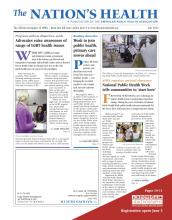Communities nationwide came together April 7-13 to celebrate and support public health during the 2014 National Public Health Week observance. Many events centered around this year’s theme of “Public Health: Start Here.”
On the campus of the University of Alaska in Anchorage, Alaska, a variety of events recognized National Public Health Week. A weeklong information and book display promoted public health in the library. Representatives from the Alaska Department of Health and Social Services and the Alaska Native Tribal Health Consortium presented the new Healthy Alaskans 2020 indicators for the state. Public health students hosted hula hoop exercise breaks and offered information on a variety of health topics. Because the school offers distance learning, students in other states took part as well, such as an organic farm tour in Ohio and a public health fair at an apartment complex in California. To wrap up the week, a number of university groups came together to host a drive-in movie event featuring “Contagion.” Also during the public health observance, students went to the polls to vote on banning smoking on campus, which passed.

In Phoenix, the Passage coalition holds an assembly with information on exercise, nutrition and portion control.
Also in Anchorage, the mayor signed a proclamation supporting National Public Health Week.
At Grand Canyon University in Phoenix, Ariz., health student volunteers worked to spread awareness of National Public Health Week and educate fellow students, faculty and staff on how public health fits into their fields of study. Volunteers interacted one-on-one with more than 400 students and faculty, discussing how public health intersects with all majors and professions and capturing their answers to the question “What is public health?” on poster boards.
Dozens of young people in foster care, their adult allies and service providers gathered in Phoenix, Ariz., to learn about incorporating healthy behaviors into their lives. In celebrating National Public Health Week, Passage, a coalition of youth in foster care, alumni of care and community partners dedicated to bridging the gap between foster care and a successful future, organized a general assembly with a theme of healthy living. Presenters from YMCA, the Maricopa County Department of Public Health and Prana Gyana Holistic Health and Wellness Center spoke to youth about exercise, nutrition and portion control. During the event, youth ate a healthy dinner of chicken skewers, salad and rice; practiced Zumba, stress relief techniques and meditation; and learned how to eat well and stay fit at home.

Events held by the University of Alaska included an organic farm tour in Ohio as part of the school’s distance learning.
The Arizona Public Health Association in Phoenix, Ariz., hosted a sold-out spring conference during National Public Health Week on the theme of “Making Healthy Eating and Active Living the Easy Choice.” The professional development conference zeroed in on health across the life span and in every aspect of life — where people live, learn, work, play and receive health care services. More than 150 public health practitioners, early childhood educators and physical activity professionals attended the event.
Among the conference’s presenters was keynote speaker Cathy Nonas, MS, RD, CDE, senior advisor to the Bureau of Chronic Disease Prevention and Tobacco Control at the New York City Department of Health and Mental Hygiene, who spoke about New York City’s efforts to reduce sugary beverage consumption and increase fruit cart vendors. The conference also hosted a poster competition, with the winning entries focused on the health effects of sedentary office work and using community-based participatory research principles to assess rural food environments. Meeting attendees also took part in a food drive benefiting a local food bank.
The public health student-led Health Awareness Campaign at California State University in Fresno, Calif., hosted two events in celebration of National Public Health Week. During the first event, students partnered with the American Red Cross to host two Team Firestopper presentations and workshops on campus. The one-hour event educated participants about the importance of installing and maintaining smoke and carbon monoxide detectors and how to eliminate home-based injury risks. For the second event, public health students created a poster on the topic of “Emergency Preparedness: Are You Ready?” Students used items from the local 99-cent store to put together an emergency preparedness kit, highlighting the affordability of getting prepared. Organizers also developed fact sheets on emergency preparedness kits, local emergency preparedness resources and emergency preparedness on campus.
Fresno public health students also hosted a health fair on campus, which included informational booths from the Fresno County Department of Public Health’s Childhood Lead Poisoning Prevention Program, the San Joaquin Valley Air Pollution Control District and the California Health Collaborative’s Performing Above the High Project, which is aimed at reducing marijuana use among young people. About 300 people attended the health fair.

At Grand Canyon University in Phoenix, students share their answers to the question “What is public health?”
The Public Health Association at the University of California-Irvine in Irvine, Calif., hosted a number of events to observe National Public Health Week and its daily themes. To kick off the week, the association launched its annual recycling drive, rewarding people who turned in recyclable bottles and cans with a stainless steel water canteen and reusable canvas bag. Proceeds from recycling the bottles and cans went to Hacienda Orphanage in Tijuana, Mexico. Students gave away more than 250 canteens and 100 canvas bags. On Tuesday, the association partnered with public health graduate students to educate fellow students on how to prepare for emergencies. The event featured a Q&A game, with participants winning packets of a vitamin drink mix. On Wednesday, students were asked to spin a wheel and complete two sets of exercises in exchange for a water canteen. Students partnered with the university’s Health Education Center on Thursday to offer resources on healthy eating and nutrition. Participants who answered questions correctly were rewarded with trail mix. By the end of the week, events had reached hundreds of students, staff and faculty.
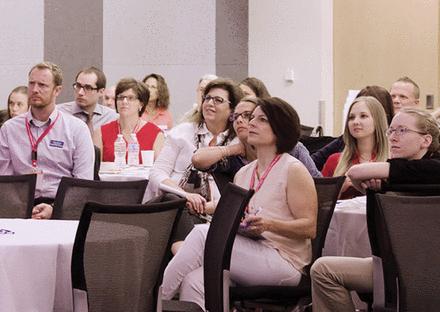
Attendees enjoy the Arizona Public Health Association’s sold-out spring conference on healthy eating and active living.
The Loma Linda University School of Public Health Student Association in Loma Linda, Calif., hosted a series of events during National Public Health Week. Monday focused on children’s health and brought child-like activities to campus for students to take part in, such as a bouncy castle and hula hoops. On Tuesday, the local emergency and disaster response team hosted a booth on campus. Wednesday highlighted physical activity and featured a mobile outdoor rock wall for students to climb. The Loma Linda Bike Hospital also set up a bike-powered smoothie station, and a local public transit representative spread the word about a new rapid transit line.
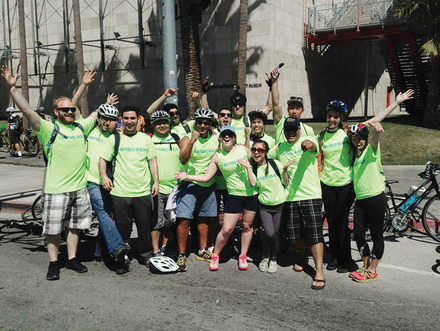
Students at the University of California-Los Angeles celebrate their events at the First Annual Tour de UCLA.
On Thursday, Loma Linda public health students handed out bananas and clementines to promote healthy eating. Students also co-hosted a viewing of “A Place at the Table,” a film about hunger in America, which attracted 100 viewers and was followed with a panel discussion. A soup kitchen-style dinner was also served and community organizations that work on issues such as hunger and poverty set up informational booths. Throughout the entire week, students conducted a photo project and asked participants to complete the sentence, “Public health is...” The answers were featured online and in a hallway within the School of Public Health.
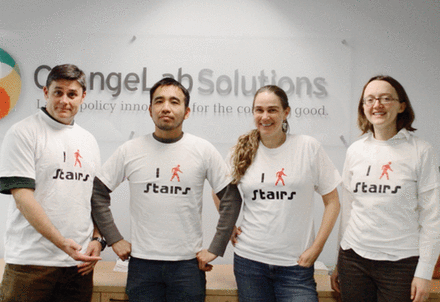
Staff at ChangeLab Solutions convinced their building management to unlock a stairwell for physical activity access.
In observance of National Public Health Week, the Los Angeles County Department of Public Health in Los Angeles, Calif., organized two Public Health Expos — one for county employees and one for community members. The employee expo kicked off in downtown Los Angeles with a theme of “A Fit Workforce Starts With You.” Public health workers partnered with the county Department of Human Resources to organize the health fair, which also served as a kickoff for the Countywide Fitness Challenge, an initiative to improve the health of Los Angeles County’s nearly 100,000 employees. The event featured about 40 booths, a pet adoption, free health screenings, a self-defense demonstration, Zumba, kickboxing and yoga. The community expo had a theme of “Prevention Starts With You!” and welcomed more than 1,200 attendees. The event featured 39 booths of information, free health screenings, cooking demonstrations, live music, a free pet vaccine clinic, a children’s ballet performance and more. Attendees could also receive help signing up for health insurance.
In Los Angeles, Calif., Students of Color for Public Health at the University of California-Los Angeles, along with partners from the university’s Fielding School of Public Health, explored “Intersections in Public Health.” The week of activities began with APHA member S. Jody Heymann, MD, PhD, MPP, dean of the school of public health, discussing the various intersection she had worked at during her career. APHA member Richard Jackson, MD, MPH, chair of Environmental Health Sciences at the university, spoke about intersections between public health and the built environment, including efforts to enhance biking opportunities in Los Angeles and on campus. Representatives from the campus bike shop, bicycle coalition and transportation services ended the first day of events with the First Annual Tour de UCLA.
Throughout the weeklong celebrations, Students of Color for Public Health and its partners presented discussions on intersections in public health that included topics such as emergency preparedness, public health law, food policy, farmers markets, community muralism and theater performance. The week wrapped up with a discussion on the impact of media on knowledge, attitudes and behaviors and featured APHA member Sandra de Castro Buffington, MPH, director of the university’s new Global Media Center for Social Impact. The week also ended with a networking event and panel discussion with graduate and professional students from various departments with the public health school.
ChangeLab Solutions in Oakland, Calif., released a short video in celebration of National Public Health Week documenting the organization’s success in opening up a stairwell in its office building. Previously, some staff members had taken on the challenge of walking up to the eighth floor and then taking an elevator down to the fifth floor where the ChangeLab Solutions offices were located, as the fifth floor door to the stairwell was locked. Upon realizing that other building dwellers were interested in using the stairs, a group of workers formed “Flight Club” and approached building management about unlocking the stairwell doors.
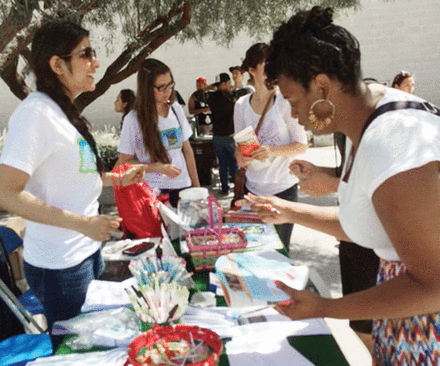
Students at California State University in San Bernardino, Calif., set up information tables and held class presentations.
At first, management simply provided ChangeLab employers with keys to the stairwell door. But a year later, they announced they would open the stairwell to all tenants. ChangeLab Solutions showcased its efforts during National Public Health Week to encourage others to make healthy changes in the workplace.
The College of Allied Health at California Baptist University in Riverside, Calif., and its community partners hosted a weeklong awareness campaign during National Public Health Week. Activities focused on balance and strength testing, first-aid and CPR training, smoothie and fresh juice demonstrations, volunteer sign-ups for disaster relief training and nutrition trivia contests. The school rallied around three public health petitions, collecting 50 signatures for each one. The petitions called for supporting the Prevention and Public Health Fund, adequately funding public health and supporting school-based health centers.
National Public Health Week events in San Diego, Calif., began in mid-March at the 33rd Annual Convention of the International Health, Racquet and Sportsclub Association. During its convention, the association launched a new public health campaign called #WhyGetActive to increase awareness about physical activity. Also in support of National Public Health Week, the association launched a foundation to promote the implementation of evidence-based health promotion programs in health clubs. As part of its efforts, the association has partnered with researchers to study the return on investment of physical activity programs.
The Orange County Health Care Agency in Santa Ana, Calif., used National Public Health Week as an opportunity to recognize its coalition partners and share local success stories. A display about the partnership was placed within the Hall of Administration. Each of the agency’s public health divisions presented a certificate of appreciation to coalition representatives during a recognition event. Workers also raised awareness about the county’s community health improvement plan, and a Public Health Week Resolution was presented to the director of public health services.
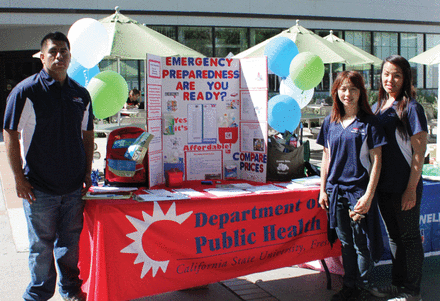
Public health students at California State University in Fresno, Calif., host a health fair on campus with booths.
Students at California State University in San Bernardino, Calif., in partnership with the Department of Health Science and Human Ecology and Eta Sigma Gamma National Health Education Honorary set up tables and classroom presentations each day of National Public Health Week in conjunction with each of the five daily themes. The first day focused on maternal health and prenatal care and involved distributing pamphlets about breastfeeding and prenatal care to students with children. On Day Two, students set up tables in front of the student union to pass out information on emergency preparedness and pandemic flu. The day’s events also included classroom presentations and raffles for emergency preparedness starter kits.
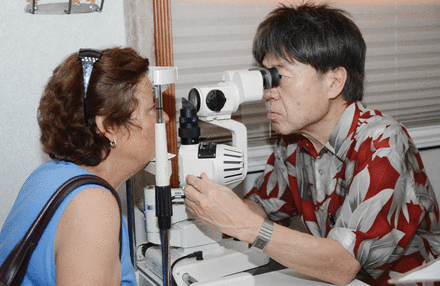
A visitor has her eyes screened at a health expo organized by the Los Angeles County Department of Public Health.
On Day Three, San Bernardino students passed out pamphlets about communicable disease as well as condom popsicles to promote prevention. On Day Four, students promoted food safety and nutrition via classroom presentations and brochures. On the last day of the weeklong celebration, students promoted the Affordable Care Act during a classroom presentation. To measure the impact of their National Public Health Week activities, students followed up by surveying participants on what they learned.
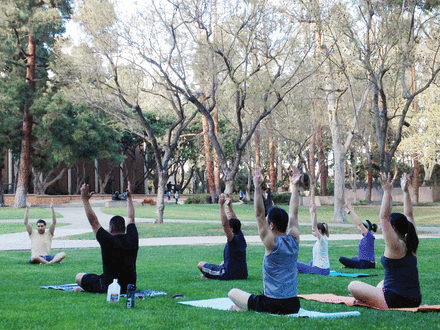
A National Public Health Week yoga event is held at the University of California-Los Angeles.
The International Health and Epidemiology Research Center in Sherman Oaks, Calif., celebrated National Public Health Week with its 20th annual Anti-Violence Campaign and Peace Day. The center’s activities began with a public service announcement, which ran on the radio several times a day, followed by an interview with Radio Hamrah. Both media events were based in Los Angeles.
The Peace Day event, which took place in Irvine, Calif., attracted hundreds of participants, especially children. During Peace Day, children were encouraged to turn in their toy guns and violent video games to receive certificates and awards. Children were also asked to draw or write something about nonviolence and peace. Educational materials in a variety of languages, art displays and a petition were also highlighted to raise awareness about violence. The goal of Peace Day is to educate parents and youth about violence, with a focus on gun-related violence.
National Public Health Week began with the first annual Rocky Mountain Region Public Health Case Competition at the University of Colorado Anschutz Medical Campus in Aurora, Colo. Organized by public health students, seven teams were charged with developing a creative solution to address vaccination rates in the state. Competitors presented their proposal to a panel of judges, which included the dean of the school of public health and a representative from the Colorado Department of Health and Environment. The winning team developed a mobile application to educate the public about vaccinations. Other public health events include a cooking class at the Health and Wellness Center and free caries risk assessments and fluoride varnishes provided by dental students. Students also worked with Groundwork Denver to repair horse crossings and pick up debris at a nearby creek after a flood.
The School of Public Health campus at Colorado State University in Fort Collins, Colo., hosted a public health career panel during National Public Health Week. Panelists included representatives from the U.S. Department of Agriculture and Centers for Disease Control and Prevention. Attendees learned about networking, desired skill sets and more.
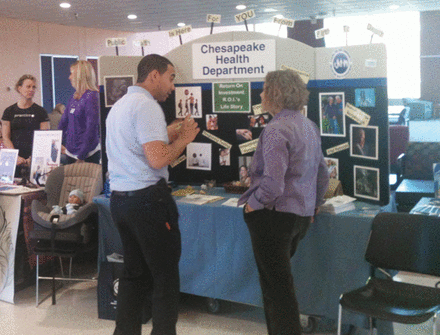
Students at Old Dominion University in Norfolk, Va., share information at a National Public Health Week health fair.
At the University of Northern Colorado in Greeley, Colo., public health students partnered with Weld County officials to talk about preventable disease and advocate for students’ well-being. During the event, organizers gave away healthy snacks, hand sanitizers and more.
In Pueblo, Colo., community members and staff members with the Pueblo City-County Health Department kicked off National Public Health Week with the one-mile “Walk with a Doc,” which was led by Public Health Director Christine Nevin-Woods, DO, MPH. The weeklong celebration also began with a reading of a Public Health Week proclamation, recognition of the 2014 Pueblo Public Health Champion, and a presentation about preventive workplace wellness options related to the Affordable Care Act.
Medical students in Santo Domingo, San Pedro de Macorís and La Vega, Dominican Republic, used National Public Health Week to raise awareness about six infectious diseases affecting the Caribbean Hispanic population. Building on the 2014 World Health Day theme of “Small Bite, Big Threat,” medical students educated university and community members about taking measures to prevent cholera, dengue, chikungunya, leptospirosis, lymphatic filariasis and malaria. Students educated people on early recognition of disease symptoms, eliminating mosquito-breeding sites, reducing exposure to environmental vectors and improving sanitation practices. At the Universidad Iberoamericana, student teams educated the academic community about preventing the six infectious diseases, distributed information to homes and implemented an interactive campaign at a local subway station.
To kick off National Public Health Week, members of the Stempel Public Health Association at Florida International University in Miami, Fla., hosted “Understanding the Affordable Care Act,” which featured two speakers who discussed the law’s implications for college students. On Wednesday, public health students organized a movie showing of “Dallas Buyers Club,” a film about the early HIV/AIDS epidemic, and used the event to raise awareness about HIV prevention. On Thursday, the association hosted a cardio kickboxing demonstration and invited students to take part in a 30-minute workout. The week culminated with a social event designed to bring public health students, faculty and staff together to network and celebrate public health.
Also at Florida International University, six graduate students dressed in scuba gear staged a “snorkel-in” to raise awareness about climate change and the threat it poses to Miami’s communities. The theme of the event was “Save Miami from Going Under...(Water That Is)” and included a seaweed-eating contest and distributing information about ways students could lower their carbon footprints.
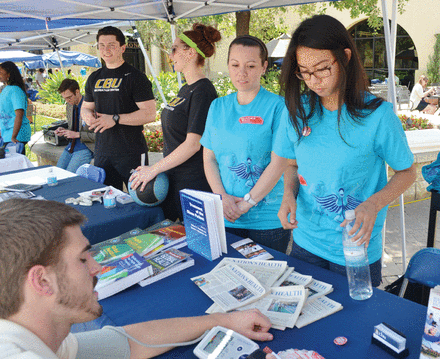
Students at the College of Allied Health at California Baptist University in Riverside, Calif., hosted a weeklong campaign.
Scholars from the University of Miami in Miami, Fla., came together during World Health Day, which took place April 7 during National Public Health Week, to discuss mosquito-borne illness and action needed to protect people from the often-dangerous insects. Participants spoke about issues such as global goals to decrease malaria rates, dengue fever in Africa, vector-control programs in the United States and Haiti, a dengue fever outbreak in Florida, and dengue surveillance and tracking tools. The event ended with a demonstration of a game-based intervention that pits humans against mosquitoes and that is being adapted as an educational health intervention.
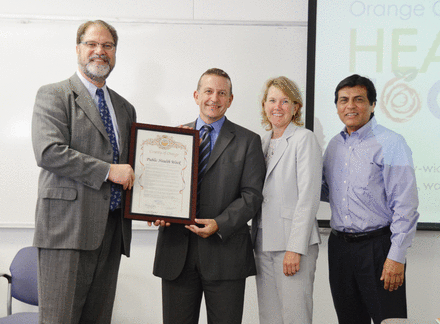
In Santa Ana, Calif., a Public Health Week Resolution was presented to the director of public health services.
Also at the University of Miami, the school’s Public Health Student Association celebrated National Public Health Week with five days of activities. On Monday, events focused on maternal and child health as well as World Health Day. Students organized an educational fair in front of a local children’s hospital and a lunch discussion with a representative from a federal initiative to reduce infant mortality disparities in Miami-Dade County. For World Health Day, researchers demonstrated a surveillance tool used to track the spread of dengue as well as a game-based intervention designed to educate people about vector-borne disease. On Tuesday, students hosted a panel with health officials and researchers to explore strategies for becoming the healthiest nation in one generation. Wednesday, students and staff learned about hands-only CPR. Thursday featured a juice mixer with community partners, a stair-climbing challenge, and a screening of the nutrition documentary “Forks Over Knives.” The week culminated in the Disease Prevention and Health Promotion Fair, which offered a wealth of information and resources.
The National University of Health Sciences in Pinellas Park, Fla., celebrated National Public Health Week with several events, including a panel discussion on “Stand Straight, Live Great!” Panelists discussed the importance of healthy posture and offered tips for healthy habits aimed at preventing injuries among children. The discussion, which welcomed more than 60 attendees, also covered an exercise workout that people can do at their workplaces to enhance posture. The university distributed information about National Public Health Week to students, faculty and staff. In addition, many students and faculty in the Doctor of Chiropractic Program sported badges with the “Public Health: Start Here” logo.
The Florida Department of Health in Seminole County in Sanford, Fla., invited residents to join the department to celebrate National Public Health Week and learn more about health services and community resources. To spread the word, health department workers set up and staffed table displays and distributed announcements. Booths offered information on Medicaid and Medicare, the hyperthermia dangers of leaving children in cars, preparing for hurricanes and other emergencies, how to make a preparedness kit, and how to find and register with a shelter.
Also during the Sanford celebrations, representatives from the National Alliance on Mental Illness provided information about mental health and recovery; a fitness instructor discussed interval training; a local practitioner provided free massages, spinal screenings and tips on stress reduction; and various health screenings, such as those for skin cancer, blood pressure and glucose, were offered. Health department staff also provided a free vaccination clinic for children entering kindergarten and seventh grade, organized a teen health expo, hosted a smoking cessation seminar and offered free testing for HIV, hepatitis and syphilis.
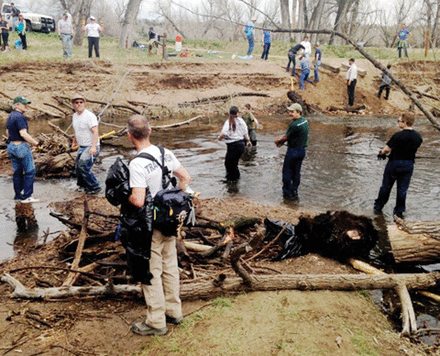
University of Colorado students worked with Groundwork Denver to pick up debris at a local creek after a flood.
The University of South Florida College of Public Health in Tampa, Fla., celebrated National Public Health Week with more than 20 events that attracted more than 2,500 participants. Activities kicked off early with a Happy April Fool’s Day: No Kidding — This is Public Health Party, which featured a T-shirt contest, trivia games and healthy snacks. Members of a nutrition class publically unveiled a new campaign, known as Edi-Bull, to bring healthier food choices to students, faculty and staff. The campaign resulted in new, healthier choices at two campus dining spots. The College of Public Health welcomed 125 people to a viewing of “Invisible Threat,” a film about vaccinations, and organized a panel discussion and mini fair on vaccine-preventable diseases. Students also led a maternal and child health symposium focused on involving men more in childbirth and childrearing and participated in a suicide awareness event.
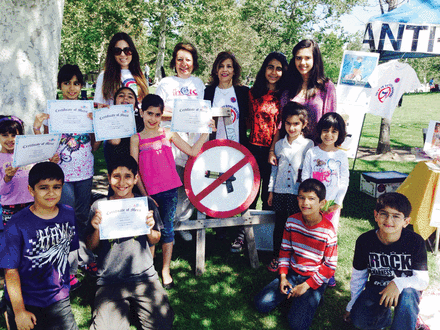
Attendees at the 20th annual Anti-Violence Campaign and Peace Day in Irvine, Calif.
Also throughout the week, Tampa public health students took part in service projects, such as volunteering at health fairs organized for Haitian and Burmese residents, cleaning up a nature preserve, and sorting medical supplies en route to countries in need. The college also hosted a free community emergency response training course and a networking fair. National Public Health Week was also an opportunity to honor excellence in education, research and service during the college’s annual NPHW Awards Ceremony, where more than 140 students and recent graduates were recognized.
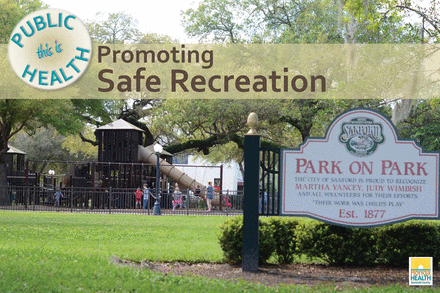
In Sanford, Fla., the Florida Department of Health in Seminole County shared the importance of safe recreation.
The University of Georgia College of Public Health in Athens, Ga., celebrated National Public Health Week with a number of events focused on this year’s theme of “Public Health: Start Here.” The week began with an annual Field Day in which faculty and students competed in dodge ball and relay events to win the Field Day Trophy. Students with the university’s Public Health Association organized a “Lunch and Learn” lecture series focusing on each of the five daily themes. The association also partnered with local wellness and nature organizations in a benefit art exhibit and sale at the Georgia Museum of Art.
Students took their healthy messages campus wide as well. The College of Public Health and Kaiser Permanente sponsored a tai chi demonstration to raise awareness about physical activity. In addition, health promotion students wore buttons to warn fellow students about the dangers of texting and walking, and master of public health and social work students encouraged people to skip the bus and walk to class with the help of walking route schedules. Other activities included a self-defense class, a CPR and first-aid certification class and a bake sale to benefit a local community kitchen.
Caregiving and disaster preparedness were the focus of another National Public Health Week event at the University of Georgia College of Public Health. A team of students distributed 250 purse-sized preparedness kits to caregivers as well as to places where caregivers congregate. The kits included a small neon orange tri-fold card on which people can list contact information and medications and came in a waterproof sleeve. Attached to the sleeve was a wind-up flashlight that works without a battery. The event also helped raise awareness about the role of caregivers in the community.
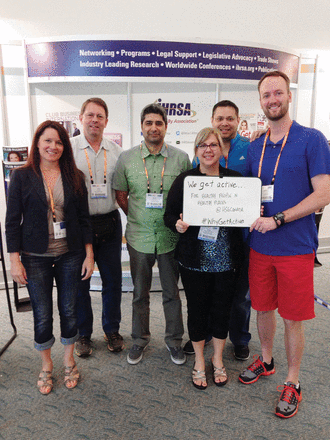
At the 33rd Annual Convention of the International Health, Racquet and Sportsclub Association in San Diego
The Mercer Public Health Association celebrated National Public Health Week on Mercer University campuses in both Atlanta and Macon, Ga. The week began with a session about what public health is and does and encouraged participants to start their own public health campaigns at home. On Tuesday, emergency preparedness experts taught public health students how to prepare for emergencies and raffles were held to give away emergency preparedness kits. Wednesday focused on obesity prevention and was celebrated with Zumba classes and dancing. Nutrition was the focus of day four, with a healthy food presentation and demonstration on the Macon campus. The week ended with a campus-wide dodge ball tournament on the Macon campus, healthy snacks and live entertainment.
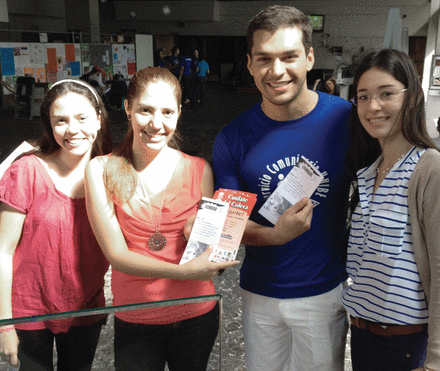
Medical students in the Dominican Republic raise awareness about six infectious diseases affecting Caribbean populations.
The Hawaii Public Health Association held a National Public Health Week mixer in Honolulu, Hawaii. More than 110 public health professionals and public health students attended, enjoying an evening of networking and making new connections. In attendance was the state’s new health department director, Linda Rosen, MD, MPH. A silent auction raised more than $500 for the association.
Master of Public Health students at the University of Illinois at Urbana-Champaign in Champaign, Ill., organized the campus’ first National Public Health Week events around five daily themes. The goal of the events was to educate students about health and wellness and how behavior change can lead to a healthier life on campus. Students organized an interactive tour of public health initiatives on topics such as nutrition, physical activity and sexual health, engaged fellow students in games and gave away prizes.
Chicago Lighthouse in Chicago, Ill., which serves people who are blind or visually impaired, celebrated National Public Health Week with a number of activities, such as a community walk, group exercises, a yoga session, a healthy lunch, informational discussions and a contest to help participants safely lose and keep off extra weight. The organization’s Wellness Committee, as well as Rush University nursing students, organized and oversaw many of the events.
Lee County Health Department in Dixon, Ill., held a weeklong series of events in honor of National Public Health Week. The week began with a breastfeeding celebration to honor mothers who currently breastfeed and answer questions from women who are considering breastfeeding or may be curious about policies at local hospitals. On Tuesday, custom-labeled bottles of water were distributed to local businesses along with emergency preparedness kit checklists, and community members were asked to spin a wheel for the chance to win items that may be missing from their emergency stockpiles, such as batteries or flashlights.
The health department hosted an open house on Wednesday, during which residents could learn about services and take advantage of free blood pressure screenings and relaxation classes. On Thursday, local workplaces were encouraged to bring healthy snacks to share and send photos of the event to the health department via its Facebook page. Health workers also visited a local elementary school to talk about healthy foods and how gardening can contribute to a nutritious diet. Local master gardeners joined the event to help students plant cucumber seeds in mini greenhouses. On the final day of the weeklong observance, the health department shared free healthy snacks on the Dixon riverfront and constructed a pedestrian gallery about the role of public health and its many successes.
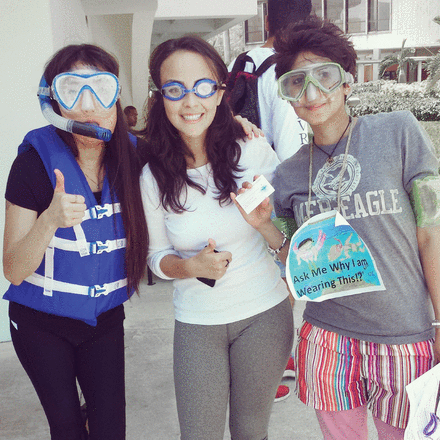
Florida International University students dress in scuba gear to stage a “snorkel-in” that raised awareness about climate change and the threat it poses to Miami’s communities.
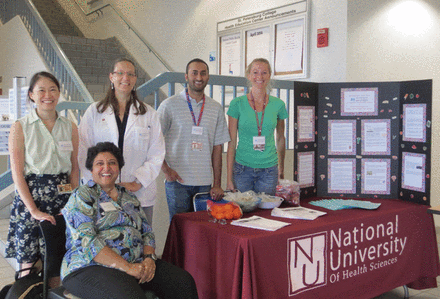
Students at the National University of Health Sciences in Pinellas Park, Fla., share health information on campus.
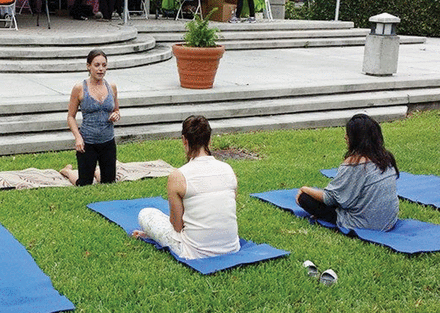
A yoga class is held during a health promotion fair at the University of Miami.
The public health student chapter at Rosalind Franklin University of Medicine and Science in North Chicago, Ill., planned several events to observe National Public Health Week. Organizing events to appeal to a broad range of students, the chapter hosted discussions about the Affordable Care Act and how it will affect the scope of practice among health professionals. Students also hosted a discussion on how health reform impacts the fields of primary care and podiatric medicine. Other activities included a screening and panel discussion of the health care documentary “Escape Fire: The Fight to Rescue American Healthcare” as well as discussions about the roles of pharmacists and physician assistants in a changing health care system. More than 60 students participated in the events.
In Indianapolis, Ind., the Marion County Public Health Department observed National Public Health Week with a series of employee-focused events highlighting the importance of caring for the body, mind and soul. On Monday, staff took part in a “Family Feud”-style game, answering questions about a variety of topics. Tuesday focused on emergency preparedness with a presentation to help employees prepare their homes and cars for a disaster. The department’s Toastmasters group — the Speaking of Health Toastmasters Club — invited a faculty member from the Indiana University Fairbanks School of Public Health to talk to the club about food deserts. Thursday, nutrition staff provided healthy snacks and engaged employees in interactive games to assess their knowledge of nutrition. Friday focused on relaxing and reflecting during a series of yoga sessions. Employees learned stretching and breathing exercises they could do at their desks and were introduced to aromatherapy.
Palmer College of Chiropractic in Davenport, Iowa, celebrated National Public Health Week with “10 Steps This Week Toward Better Health.” The event featured keynote speakers who presented evidence-based approaches to improving overall health and well-being. Other discussion topics included the health benefits of laughter, the importance of physical activity and nutrition, routine health screenings and health promotion. Attendees were encouraged to take an active role in the community and help make the U.S. the healthiest nation in one generation.
At the Johnson County Health Department in Olathe, Kan., health workers participated in television interviews, gave out seed packets to participants in the Women, Infants and Children Program and distributed emergency preparedness materials.
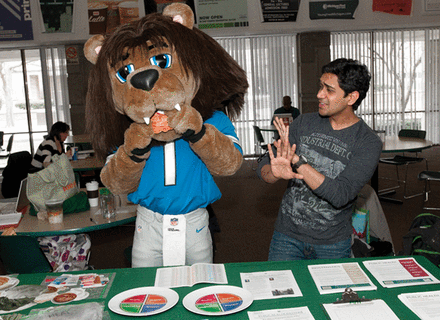
Roary, the Detroit Lions mascot, visits a National Public Health Week event held at Wayne State University.
The Kansas Public Heath Association and Kansas Health Institute in Topeka, Kan., celebrated National Public Health Week with a luncheon about the County Health Rankings. Attendees from Kansas and Missouri learned how the rankings were generated and the reports are used. A panel of Kansas public health professionals from three counties shared how they used the data to improve health. The association also obtained Public Health Week proclamations from Gov. Sam Brownback as well as the state House and Senate.
At the Sedgwick County Health Department in Wichita, Kan., health workers handed out informational cards with health messages for each day of National Public Health Week. The department also presented awards to local public health leaders.
During National Public Health Week, the University of Louisville School of Public Health and Information Sciences in Louisville, Ky., welcomed Donna Petersen, ScD, MHS, CPH, dean of the University of South Florida College of Public Health and a member of an Association of Schools and Programs of Public Health task force charged with creating a new vision for public health education. Petersen, an APHA member, discussed the task force’s work and progress. That same day, the school’s Student Government Association hosted a career panel about working in the public health field. Also during the week, students and faculty used Skype to discuss pandemic flu preparedness with Maleeka Glover, ScD, MPH, a senior research scientist at the Centers for Disease Control and Prevention. The Student Government Association set up a booth on campus to raise awareness about public health, give away healthy snacks and host a cooking demonstration. Public health students also planted trees in West Louisville as part of an urban restoration program. In addition, during the school’s weeklong walking competition, the Student Government Association gave out more than 60 free pedometers.
A team of community health workers at Tulane University’s School of Public Health and Tropical Medicine in New Orleans, La., organized a number of events in honor of National Public Health Week, including the “Umoja Celebration of the African-American Child,” a health and culture fair open to all. The workers also organized the Lose Dat Program healthy cooking demonstration, an interactive women’s wellness support group and a disaster preparedness session. On Wednesday of National Public Health Week, the community health workers organized a session with the Fussy Baby Network about newborns, soothing fussy babies and infant parenting. On Thursday, seniors were encouraged to attend a session on emergency preparedness and diabetes management session, and on Friday residents were invited to a seminar on domestic violence.
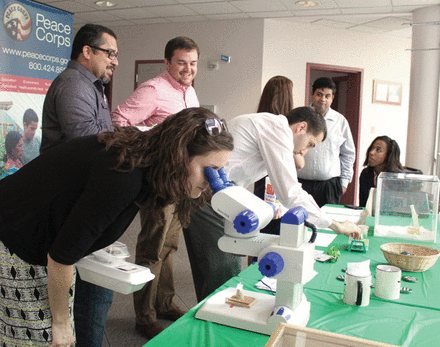
The University of South Florida partners with the local public health community to address vector-borne diseases.
In observance of National Public Health Week, the Anne Arundel County Department of Health in Annapolis, Md., hosted an open house and a nature walk for employees and the public. The open house provided health information for all ages and on a variety of topics. The department also honored 10 employees with Public Health Hero Awards.
The Public Health Department of Walter Reed National Military Medical Center in Bethesda, Md., celebrated National Public Health Week with a one-day health fair that brought together representatives from across the medical center with a goal of educating staff and patients about healthy lifestyles and the role of public health within the center.
Healthy Montgomery, the community health improvement process in Montgomery County, Md., launched its behavioral health and obesity plans in conjunction with National Public Health Week. County officials and community stakeholders gathered to release the Healthy Montgomery Obesity Action Plan and Healthy Montgomery Behavioral Health Action Plan, which provide frameworks for improving the health and well-being of county residents. Both plans called for the coordination and enhancement of existing programs and services to strengthen community health.
Northeastern University’s Health Disparities Student Collaborative in Boston, Mass., hosted a number of events during National Public Health Week. The week began with a Tropical Fundraiser to raise money for End 7, a nonprofit group working to eliminate seven neglected tropical diseases by 2020. The fundraiser, in which runners were asked to donate $7 to participate, raised enough money to treat hundreds of children for a year. The collaborative also hosted Healthy BBQ-Democratic Plaza, during which students dined on free veggie burgers and fruit and participated in Democratic Plaza, which consisted of a large four-sided chalkboard with a question written on each side to facilitate discussions about health. That same evening, the collaborative organized a mentoring event with public health professionals from various fields. The event was similar to speed dating, with each student having 20 minutes to meet a mentor.
Later in the week, the collaborative set up a health fair on campus with resources on topics such as preconception health, smoking cessation and CPR. On the last evening of the week, two university police officers taught a women’s self-defense class, in which attendees learned how to defend themselves, avoid attackers and prevent dangerous situations.
The Boston University Master of Social Work-Master of Public Health Program in Boston, Mass., hosted a “Public Health: Not Just for MSW-MPH Students!” celebration during National Public Health Week to raise awareness about educating emerging social workers on how to use the social determinants of health to describe their work. To emphasize the connections between public health and social work, student interns created an interactive bulletin board display where students, faculty and staff could write down what health meant to them. MSW-MPH students also provided a chart to help students understand which social determinants they address in their social work roles. The display also offered information on health equity, social justice, and the important role that social work plays in improving population health in the era of the Affordable Care Act.
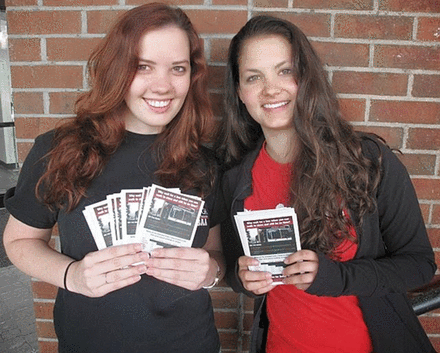
Students at the University of Georgia College of Public Health in Athens, Ga., share handouts.
In observance of National Public Health Week, the Brookline Department of Public Health in Brookline, Mass., hosted an annual rabies clinic, where for a minimal fee residents could get their pets vaccinated. Brookline residents attended the Wellness in the Village Fair, which showcased local health, wellness, meditation and movement practitioners with demonstrations of yoga and tai chi. The fair also hosted sessions on healthy eating, body work and acupuncture and ended with a four-mile run. A local dental group observed National Public Health Week by offering one filling, one extraction or one cleaning to people ages 18 years old or older who were not able to access dental care.
Other Brookline events included a free CPR and automated external defibrillator training held at Brookline High School, which welcomed 60 attendees. The health department also organized a food safety talk at the Brookline Senior Center. A discussion on “Meditation: Connecting Your Brain and Your Health” attracted a number of attendees and included a guided meditation practice. Parents, students and faculty attended a conversation about “The Changing Face of Marijuana — Revisiting the Conversation with Adolescents.” Public health workers also met with young children to talk about where food comes from and the benefits of gardening, and engaged them in prepping Brookline’s community garden for spring plantings.
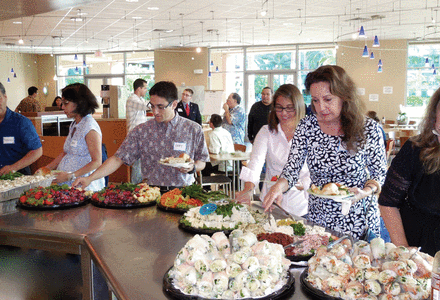
The Hawaii Public Health Association holds a National Public Health Week mixer in Honolulu. More than 110 public health professionals and public health students attended.
The Worcester Division of Public Health in Worcester, Mass., celebrated National Public Health Week with a Public Health Career Panel at Clark University. The event was designed to build interest in the field of public health and marked the launch of the new Center for Public Health Practice, a long-term collaboration between Clark University and the Worcester Division of Public Health. Attendees were curious about a variety of topics, such as public health emergency preparedness, technology in public health and opportunities to get involved in local projects.
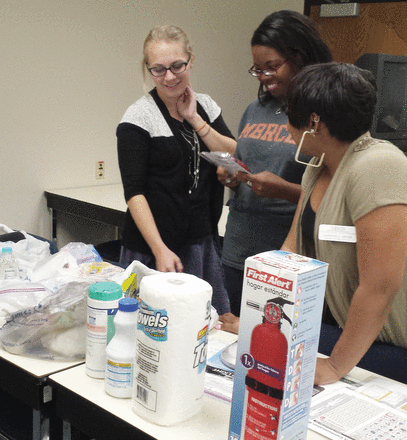
In Georgia, the Mercer Public Health Association worked with emergency preparedness experts to share information.
The Public Health Student Organization of Wayne State University in Detroit, Mich., kicked off National Public Health Week with a keynote address from university President M. Roy Wilson, MD, MS, who spoke on the topic of health disparities. After the keynote, attendees were able to browse posters of student research and conference presentations. The week continued with a variety of health promotion activities and conversations. On Tuesday, members of the Public Health Student Organization attended ballroom and Zumba classes. Wednesday, the students joined APHA’s National Public Health Week Twitter chat. On Thursday, public health students offered nutrition education to students, faculty, staff and community members. Roary, the Detroit Lions mascot, even stopped by to help get everyone excited about healthy eating. The week wrapped up with a lecture on “Racism and Bias in Healthcare: Let’s Talk About It,” which was organized to facilitate conversations between public health and medical students.
Health education students at the University of Michigan Department of Public Health and Health Sciences in Flint, Mich., partnered with the university’s Early Childhood and Development Center to organize a children’s health fair in observance of National Public Health Week. The health fair, “Say Hello to Health,” was designed to engage children ages 2 to 5 years old and was focused on helping kids adopt healthy behaviors early in life. Children learned about hand-washing, oral health, healthy eating and physical activity. For example, at the oral health station, children viewed an interactive video about brushing their teeth and then practiced brushing using a large-scale model of teeth and gums. Other activities included a duck pond game, in which children choose toy ducks with healthy and unhealthy food stickers and discussed which choices were the healthier options. Throughout the event, children could win prizes for participating.
The Macomb County Health Department in Mt. Clemens, Mich., celebrated National Public Health Week starting with a “Spring into Health!” event at a local community center. Participants received free glucose screenings, were able to dispose of unwanted non-narcotic medications, learn about health department programs and take part in exercise demonstrations. More than 250 people attended the event. Volunteers from the Medical Reserve Corps joined activities on Tuesday to teach community members how to prepare for emergencies. On Wednesday, health workers and their community partners provided free car seat inspections. Sixty-one car seats were checked. Thursday focused on healthy eating with “Eat Well, Be Well” at a local marketplace. Attendees were able to sample healthy foods and take home recipes and nutrition information. The week ended with a household hazardous waste collection event, in which people in 250 cars dropped off hazardous materials, such as pesticides and automotive products, for proper disposal. Health workers collected an average of 35 pounds per vehicle.
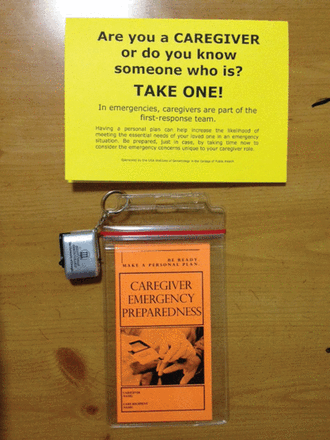
Disaster preparedness tips were shared by the University of Georgia College of Public Health.
The University of Minnesota School of Public Health in Minneapolis, Minn., celebrated National Public Health Week with a number of events. The school partnered with the Minnesota Department of Health, the Minnesota Public Health Association and the Local Public Health Association of Minnesota to convene the 2014 State of Public Health Forum with a theme of “Public Health in All Policies.” Minnesota Commissioner of Health and APHA member Ed Ehlinger, MD, MSPH, provided the keynote address. Later that evening, the School of Public Health hosted Taste Diversity, an annual event showcasing foods and culture from around the world. This year’s focus was cultures of the Middle East. During the week, the Public Health Film Series screened “More Than Honey,” a documentary about the decline in bee populations. On Wednesday of the weeklong celebration, the school’s public health community gathered for Research Day 2014 to share student projects and honor the best abstracts and posters. More than 150 people attended the 2014 Health Disparities Roundtable, which focused on access to mental health services and the impact of the Affordable Care Act on such services. The school’s National Public Health Week activities ended with the Celebration of Giving, a formal event to recognize and thank alumni, donors and friends and recognize 2014 alumni award recipients.
The Saint Louis County Department of Health in Berkeley, Mo., celebrated National Public Health Week with a variety of activities, including press and media pieces, a proclamation from the county executive, displays in three community health centers, fitness activities for staff, games for children and new public health resources delivered to school nurses in all 23 public school districts. All the activities culminated in the Community Celebration 2014, which welcomed about 1,000 attendees. The celebration featured 47 vendors, including one vendor that filled two trucks with more than 9,000 pounds of out-of-date electronic equipment for recycling. Also, nearly 140 children were fitted with bicycle safety helmets and hundreds of people received free glucose, cholesterol, blood pressure and BMI screenings. The celebration also displayed winning posters from the health department’s annual poster contest, which this year received more than 800 entries from kids throughout the county.
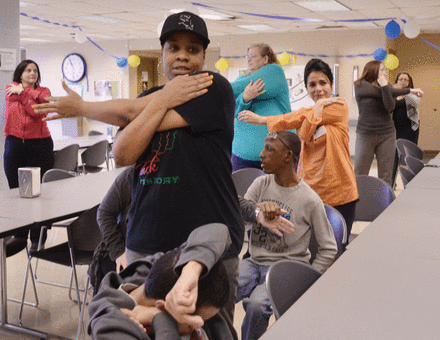
At the Chicago Lighthouse in Chicago, National Public Health Week events included a community walk, yoga, healthy lunch and group exercises, such as this stretching activity.
The Second Annual Undergraduate Public Health Scholar Bowl took place during National Public Health Week at Saint Louis University in St. Louis, Mo. Competitors hailed from schools around the country and students had the opportunity to connect with fellow public health students, attend a graduate school fair and hear a keynote address from APHA member Alexander Garza, MD, MPH, assistant secretary for health affairs and chief medical officer at the U.S. Department of Homeland Security. Macalester College of St. Paul, Minn., took home first place in the case study presentation and George Washington University received first place in the trivia challenge.
The Komen St. Louis Project in St. Louis, Mo., a community partnership created to address breast cancer mortality disparities, hosted “Get Moving, North St. Louis” in celebration of National Public Health Week. The event, which took place in an underserved area of the city that is home to some of the greatest health disparities in the region, was designed to promote the importance of healthy diets and physical activity and to help people easily incorporate physical activity into their daily lives. Activities included bike safety demonstrations, fitness tips from a personal trainer, healthy recipes, food preparation demonstrations and a drawing contest for kids.
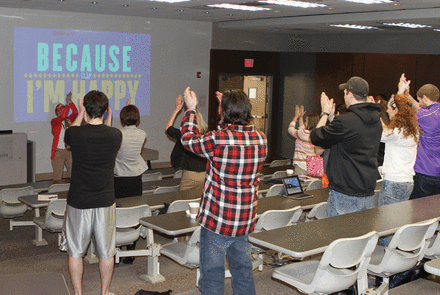
Palmer College of Chiropractic in Davenport, Iowa, celebrates National Public Health Week with a health lecture.
The University of Nebraska Medical Center College of Public Health Student Association in Omaha, Neb., kicked off National Public Health Week with a Cooking Matters healthy cooking demonstration. Later in the week, the association hosted a screening of “Escape Fire: The Fight to Rescue American Healthcare” and a panel discussion followed featuring two primary care physicians. Public health students decided to take advantage of the good weather to get some exercise and organized a game of Wiffle ball. The week’s activities ended with a presentation from Joseph Acierno, MD, JD, chief medical officer and director for the Division of Public Health for the Nebraska Department of Health and Human Services, who spoke about the importance of partnership building.
The Student Organization for Health Leadership at the University of New Hampshire in Durham, N.H., organized a number of activities to celebrate National Public Health Week. Students headed to Pawtuckaway State Park to hike to the summit of South Mountain. Members of the university’s chapter of Slow Food set up a table on campus to educate students about the food system. Other activities included a guided meditation session, a rally against violence against women, a men’s health information table and an outdoor yoga class.
In celebration of National Public Health Week, the East Orange Department of Health and Human Services in East Orange, N.J., honored state Sen. Nia Gill for her work in advancing enrollment in insurance under the Affordable Care Act. The health department also honored City Councilman Ted Green for his work with the city’s youth and his support of obesity prevention goals. In addition, the health department is proposing a citywide walking challenge that would include all eight city parks.
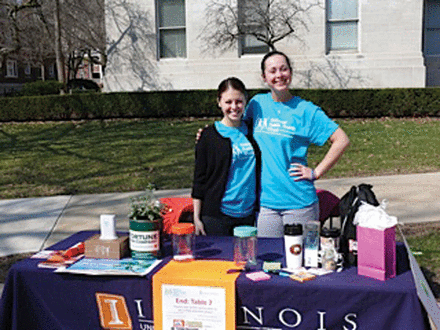
Master of Public Health students at the University of Illinois at Urbana-Champaign share health information.
The Alliance Center for Independence in Edison, N.J., observed National Public Health Week with a Walk & Roll event to promote exercise. Participants walked through the town of Fords, N.J., holding up signs about public health. The center is a nonprofit organization that promotes independent living for people with disabilities in three New Jersey counties.
The Rutgers School of Public Health in Piscataway, N.J., held its 19th Annual Public Health Symposium during National Public Health Week. The symposium topic was “Public Health GPS: Moving In New Directions” and featured a keynote addressed from interim dean of the School of Public Health and APHA member George Rhoads, MD, MPH. Other speakers discussed issues such as the Affordable Care Act, the changing role of public health professionals and why local public health departments must move toward accreditation. The symposium is also an opportunity for students and public health professionals to present their innovative community initiatives and areas of research. This year, 12 posters were presented on a variety of topics, including adult immunizations, lead poisoning prevention and the overuse of antibiotics. More than 160 students, practitioners and faculty attended the symposium.
Master of Public Health students at Long Island University in Brooklyn, N.Y., along with the university’s Public Health Club organized “Turn Up for What?” in honor of National Public Health Week. The event, which was organized to increase awareness and education around binge drinking, had five interactive stations: Media Zone, Drinking Nightmare, the Binge Factor, Size Does Matter and Scavenger Hunt. Participants had to complete at least two stations and post an evaluation before claiming prizes and receiving food. More than 120 people took part in the event.
The University at Buffalo-State University of New York School of Public Health and Health Professions in Buffalo, N.Y., recognized National Public Health Week with a number of events. The week began with the annual Saxon Graham Lecture, which this year featured APHA member JoAnn Manson, MD, DrPH, MPH, chief of the Division of Preventive Medicine and co-director of the Connors Center for Women’s Health and Gender Biology at Brigham and Women’s Hospital, who spoke about vitamin D and the prevention of cancer and cardiovascular disease. Other events throughout the week included the 4th Annual Global Health Day and Global Health Fair. The weekend ended with the annual Glen E. Gresham Visiting Professorship Lecture, which featured Edward Taub, PhD, MA, a professor in the Department of Psychology at the University of Alabama.
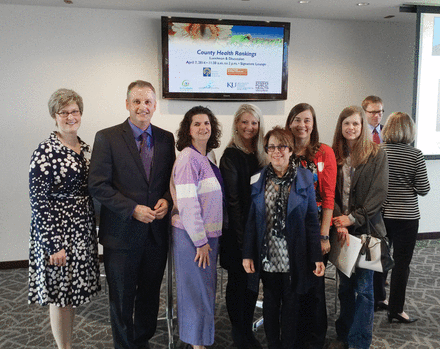
The Kansas Public Health Association and Kansas Health Institute co-sponsored a luncheon and program in Topeka, Kansas, about County Health Rankings research.
Hofstra University’s Master of Public Health Program and Society of Public Health Advocates in Hempstead, N.Y., celebrated its second National Public Health Week Event Series with more than a dozen free activities. Among the events were a campus-wide health promotion campaign, two health fairs, panel discussions, film screenings and a 5K run. The first Nassau County Minority Health Conference also took place. The conference included a panel discussion on building health equity, a health fair for high school students and film screening of “Soul Food Junkies” with the movie’s producer. Other activities at the minority health conference included an interdisciplinary student case competition exploring ways to tackle childhood obesity and a special lecture series about the Affordable Care Act. The Society of Public Health Advocates health promotion campaign included campus exhibits as well as lawn signs and sidewalk chalk messages about issues such as drinking and driving and recycling. Student volunteers also staged a flash mob about the state of health in the U.S.
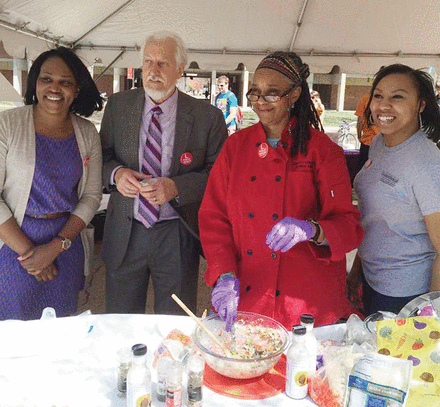
A healthy food demonstration is held at the University of Louisville in Kentucky.
In New York City, N.Y., the Monday Campaigns, a public health initiative that dedicates the first day of each week to health, released a new resource in support of National Public Health Week called the “Family Dinner Date” newsletter. Each newsletter will package a family-friendly recipe, educational items, fun facts about a recipe’s cuisine and worksheets for kids. Parents will receive the newsletter on Fridays so they have time to shop for ingredients during the weekend. To sign up for the newsletter, visit www.thekidscookmonday.org.
In celebration of National Public Health Week, students in the “Intro to Public Health” course at Skidmore College in Saratoga Springs, N.Y., launched a photo challenge that involved taking photos of a This is Public Health sticker, writing a creative caption, and posting it online using the hashtag #Skidhealth. All entries were judged by popular vote and a panel of jurors. Students also designed, planned and executed a This is Public Health Festival at the Frances Young Tang Teaching Museum and Art Gallery and invited fellow campus organizations as well as the local health department, hospital and school of public health to host informational booths. Some highlights of the festival included a Public Health Quiz Bowl, healthy food demonstrations and an a cappella performance. More than 120 people attended the festival.
State University of New York-Upstate Medical University’s Department of Public Health and Preventive Medicine in Syracuse, N.Y., hosted a number of events in honor of National Public Health Week. Lectures during the weeklong event focused on wellness and self-care, tips for keeping food safe, the Affordable Care Act and mindful eating. To promote physical activity, one of the department’s partners, the Lerner Center for Public Health Promotion, sponsored a Monday Mile Walk, while the university’s on-campus gym sponsored free Zumba and yoga classes and discounted annual membership fees. Public health and medical students came together to host a panel discussion with local public health leaders. Informational tables were set up through campus with literature on health promotion and disease prevention.
National Public Health Week began early in the Wyandanch School District in Wyandanch, N.Y., with a walk around the high school track on National Walking Day on April 2. Public health activities formally began with daily email messages to staff with health tips. Interactive workshops on topics such as healthy eating, stress management, environmental asthma triggers and the power of optimism reached more than 700 students. A ribbon-cutting ceremony took place to open a new breakfast sandwich station in the middle school.
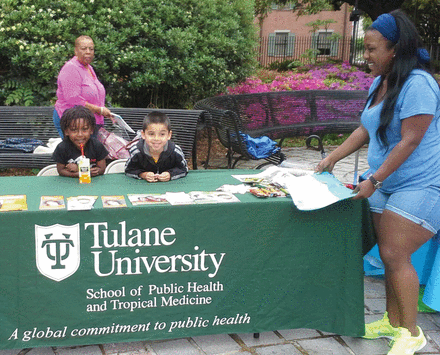
Events at Tulane University’s School of Public Health and Tropical Medicine in New Orleans included a health fair.
Campbell University in Buies Creek, N.C., hosted a disaster training course for students in observance of National Public Health Week. The course, which was designed to spark interest in eventually creating a student group within the university and county, featured speakers from local emergency management and public health agencies. A member of the National Guard also demonstrated how to pack a preparedness bag to survive for three to five days.
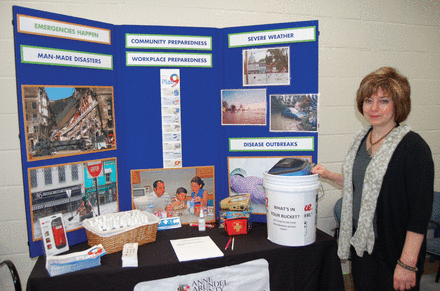
The Anne Arundel County Department of Health in Annapolis, Md., hosts its open house.
The Public Health Student Association at Campbell University partnered with a local training club to host a memorial 5K in support of National Public Health Week. The Jennifer Webb Memorial 5K was held in honor of Webb, a Campbell graduate assistant who was killed in a drunken driving crash in 2000. In organizing the race, students distributed information about drunken driving, the effect of alcohol on the body, drunken driving statistics and local treatment resources.
In support of National Public Health Week, two nursing students at the University of North Carolina-Chapel Hill in Chapel Hill, N.C., in partnership with the local senior services facility, hosted a Walking Club that met every Wednesday for 10 weeks. The club attracted older adults ages 60 to 100 years old, who walked with peers for about 30 minutes inside a building and used pedometers to track their progress. When the club began, it had only 15 active members. But by Week Six, 40 people were participating in the walks. Organizers played music for encouragement and recognized participants for increasing the number of steps they walked each week. Collectively, the group walked a total of 86 miles.
The Department of Public Health Sciences at the University of North Carolina-Charlotte in Charlotte, N.C., celebrated National Public Health Week with a range of events.
Activities included discussions on health care in economically disadvantaged parts of the world, Cuba’s health system, air quality and climate change, and physical activity’s role in aging. The week’s events continued with a farmers market, seat belt safety education and make-your-own disaster relief kit activity. The school also held an induction ceremony for its Delta Omega Honorary Society in Public Health, Beta Phi Chapter.
In celebration of National Public Health Week, the Montgomery County Health Department in Troy, N.C., hosted events for employees and community members. During the week, the Fit Youth Initiative worked with students after school to provide physical activity and nutrition education. Health educators spoke with older adults about preparing for an emergency, and the health department took part in opening day events at a local farmers market. At West Montgomery High School, health workers promoted awareness about sexually transmitted diseases and set up a table where students could find information. County employees were invited to take part in a National Public Health Week Walk. Health department employees took part in Healthy Snack Day, bringing in a nutritious snack for all to enjoy.
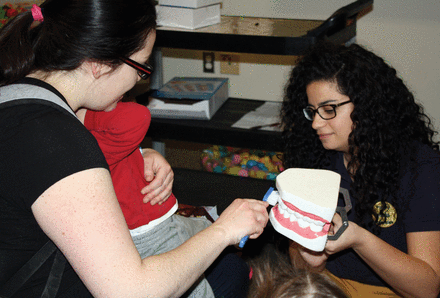
A student at the University of Michigan Department of Public Health and Health Sciences in Flint, Mich., teaches visitors about oral health.
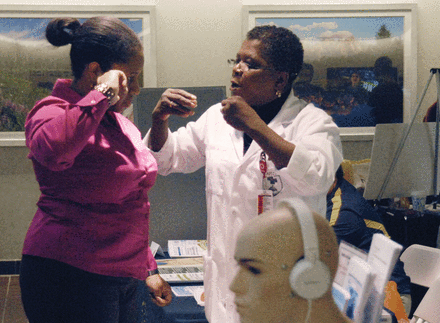
Safe ear plug use is demonstrated at a health fair at Walter Reed National Military Medical Center in Bethesda, Md.
In support of National Public Health Week, North Dakota Gov. Jack Dalrymple issued a proclamation in Bismarck, N.D, declaring April 7–14 as Public Health Week.
North Dakota State University in Fargo, N.D., celebrated National Public Health Week with a number of activities, including discussions about public health careers, healthy eating and physical activity.
To celebrate National Public Health Week, the University of North Dakota Public Health Association in Grand Forks, N.D., hosted a table on campus with information about nutrition and healthy eating, including how to eat on a budget and how to avoid foodborne illness. Public health students also gave out free fruit and held drawings for gift certificates to a local co-op. To promote physical fitness, the association went rock climbing and invited students and staff to join them. After rock climbing, students put up This is Public Health stickers around campus to highlight public health’s role in everyday life. On Wednesday, undergraduate public health students hosted a table on campus about the importance of sleep, had drawings for free pillows and hosted a nap room.
The Cincinnati Health Department in Cincinnati, Ohio, celebrated National Public Health Week with an event on the city’s famous Fountain Square. The celebration featured health insurance sign-ups, body mass index measurements, dancing demonstrations, free seeds, health information, children’s activities, a performance from a nationally recognized double Dutch team and an appearance from a local resident who competed on the television show “The Biggest Loser.”
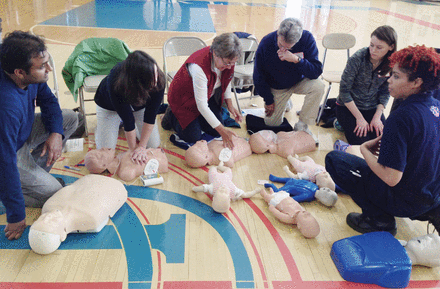
Residents in Brookline, Mass., take part in free CPR training offered by the Brookline Department of Public Health.
Ohio State University College of Public Health in Columbus, Ohio, held a variety of events. On Monday of National Public Health Week, cycling machines were provided in the college’s lobby to promote physical activity. On Tuesday, the college presented its first Thompson Public Health Award to CVS Caremark Corporation for its decision to stop selling tobacco. Tuesday also featured a screening and panel discussion about “The Raising of America: Early Childhood and the Future of our Nation,” which explores the importance of healthy childhoods. On Wednesday, the college hosted “Public Health Through the Lens of an iPad,” which discussed how foundations are embracing new technology to improve health. Representatives from Child Legacy International, which runs a health facility in rural Malawi, visited to explore collaboration opportunities. On Thursday, the college hosted a luncheon of the Farm to Table Study Program, and the Association of Future Healthcare Executives held its annual leadership development symposium. To wrap up the week, the Buckeyes 4 Public Health and Student Ambassadors for Public Health jointly led a walk around campus.
Summit County Health District in Stow, Ohio, began its National Public Health Week efforts with a news release identifying this year’s daily topics. The health department also ran advertisements in local newspapers to educate residents on the department’s services. Magnets with services information on them were made for residents to take home. Health district workers also took part in quizzes related to the daily themes and tested the members of the local Board of Health as well.
The Oregon State University Public Health Club in Corvallis, Ore., organized a Public Health Fair in honor of National Public Health Week. Nearly 25 booths offered resources on healthier living and were staffed by representatives from a variety of organizations, such as the American Red Cross and the Humane Society. Attendees also learned about public health through bingo games that tested their knowledge of public health. Hundreds of people attended the event.
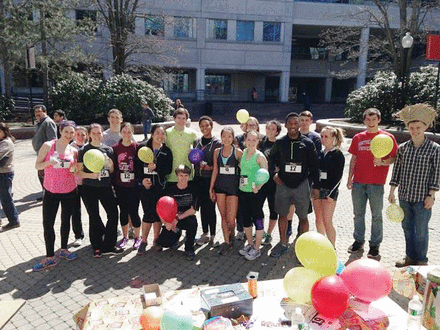
At Northeastern University in Boston, students held a Tropical Fundraiser to raise money for neglected tropical diseases.
National Public Health Week was celebrated throughout Oregon. The Oregon Public Health Association hosted a speaking engagement with APHA member Robert Lawrence, MD, a professor in the Center for a Livable Future at Johns Hopkins Bloomberg School of Public Health, who spoke on the impact of high-meat diets on health, the environment and the food supply. The event was broadcast live on the Web so people outside of Portland, Ore., could see it as well. The association also partnered with the Oregon Health Authority Public Health Division to host “Building Bridges: Achieving Health in All Policies Through Cross-Sector Collaborations,” a panel discussion on the intersection between public health, education, health care and transportation policies currently in development in Oregon. The OPHA Epidemiology-Biostatistics Section hosted a science olympiad for Oregon middle and high school students. The olympiad featured a Disease Detectives tournament and to compete, students had to take an exam on environmental quality epidemiology topics.
The Oregon Master of Public Health Program in Portland, Ore., organized a poster showcase that featured the work of several students. More than 100 people attended the event.
Public health students at East Stroudsburg University in Bethlehem, Pa., celebrated National Public Health Week with the first Healthy You Day, which featured nutrition promotion and smoothie tasting, diabetes information, Zumba demonstrations, oral health presentations, stress management activities, sexually transmitted disease education, blood pressure screenings and household emergency preparedness, among other activities.
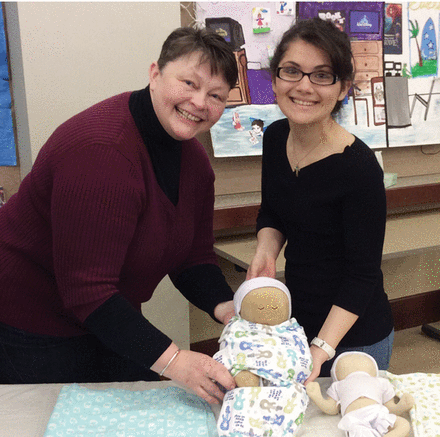
The Macomb County Health Department in Mt. Clemens, Mich., celebrated with a range of community events.
For the first time, National Public Health Week was celebrated at Penn State Hershey and Milton S. Hershey Medical Center in Hershey, Pa. Hosted by the Public Health Association for Service and Education, events included educational booths located in the main hospital entrance and featured posters on topics such as safe sleep for infants, emergency preparedness, skin care, melanoma, food safety, raw milk myths and foodborne illness prevention. Activities also included live demonstrations of water filtration and how to cook with a Dutch oven during natural disasters. In addition, public health students organized lectures for visitors, clinicians, faculty and fellow students that coincided with each day’s theme.
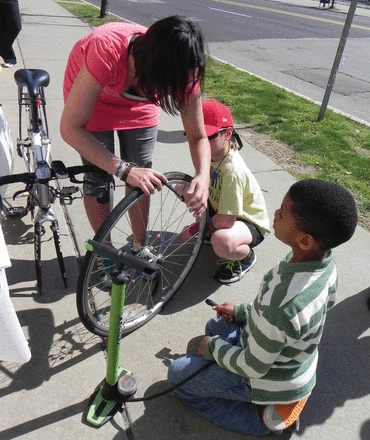
Bike safety is demonstrated at an event held by the Komen St. Louis Project in St. Louis in April.
Also at the medical center, foot and ankle specialists measured attendees’ feet as part of a research project to compare people’s current shoe size with their measured foot size. One of the breakout sessions at the event focused on maintaining healthy feet.
Public health students at Drexel University in Philadelphia, Pa., recognized National Public Health Week with a table on campus. Students handed out water, fruit, National Public Health Week brochures and tote bags, hand-sanitizing wipes, This is Public Health stickers, Drexel T-shirts and other freebies. Students and staff answered public health-related questions and won prizes. Students also put up a white board where students and staff could write what public health meant to them.
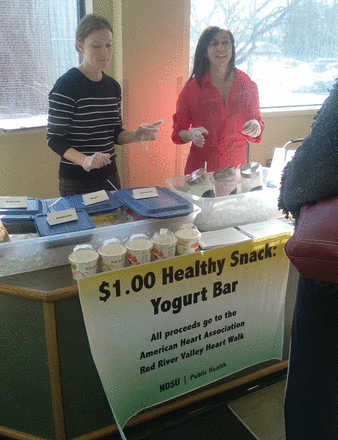
Events at North Dakota State University in Fargo, N.D., included a healthy yogurt snack bar.
To celebrate National Public Health Week, the Thomas Jefferson University Jefferson School of Population Health in Philadelphia, Pa., developed Health Walk Historic Philadelphia, a public health walking guide to the city. Students served as tour guides for the three-mile walking tour, which visits 11 sites that represent important moments in the history of public health. Tour participants walked through the city as public health students pointed out the public health significance of their surroundings, such as the scene of a 1976 Legionnaire’s disease outbreak, a burial site for victims of yellow fever and the nation’s first hospital.
Public health students from across Puerto Rico came together to celebrate National Public Health Week. Events began with three conferences on genetically modified foods and their impact on health and agriculture, the challenge of caring for an aging population, and the public health perspective to emergency preparedness management. Students organized a health promotion fair for older adults, which offered education on nutrition, sexual wellness and physical activity. Students also used the week to start organizing a local public health student chapter of the Puerto Rico Public Health Association.
The APHA campus liaisons at the University of South Carolina in Columbia, S.C., teamed up with the South Carolina Public Health Association Student Section and the Arnold School of Public Health Dean’s Student Advisory Council to organize Connect 4 Success in observance of National Public Health Week. The event welcomed more than 30 students to learn about the importance of networking. Nine health professionals from the community attended the event to work with students and offer feedback. Also during National Public Health Week and with support from APHA’s Oral Health Section, among others, students could learn more about oral health and safe sex during four invited sessions, which focused on the link between oral cancer and human papillomavirus, nutrition, tobacco and alcohol use and safe sex practices.
The Student Public Health Association at the University of Memphis in Memphis, Tenn., celebrated National Public Health Week with a number of events. Activities included tobacco education, soccer drills and Frisbee, raising awareness of the role public health plays in everyday life and an information session about the Affordable Care Act.
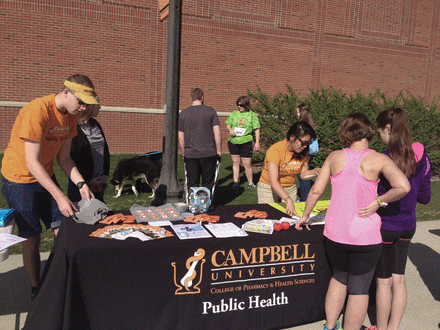
Events at Campbell University in Buies Creek, N.C., included a disaster training course and a memorial run.
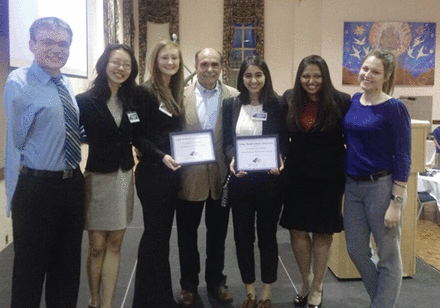
Georgetown Unversity competitors in the Public Health Scholar Bowl held by Saint Louis University in St. Louis
The Texas A&M School of Rural Public Health in College Station, Texas, kicked off National Public Health Week with an announcement about its new name — the school is now officially known as the School of Public Health. Other activities in College Station included a guided walking tour of trails; presentation of a signed proclamation officially declaring National Public Health Week in the Brazos Valley; a blood donation drive; and Lunch and Learn presentations on gay, lesbian, bisexual and transgender health, relieving pain and opportunities for research using restricted data. The week concluded with a day of volunteering with Habitat for Humanity.
To celebrate National Public Health Week, students at Old Dominion University in Norfolk, Va., hosted a National Public Health Week Fair, which offered information and resources to help attendees improve their health. Community members were also encouraged to participate in a free workout at the local community center.
In the “Principles of Public Health” course at Jefferson College of Health Sciences in Roanoke, Va., students were grouped together and assigned to tackle one of five National Public Health Week daily themes. In turn, students set up display tables, organized activities and gave away prizes. Free HIV screening was offered during the event and anyone who got tested received a free lunch from Olive Garden.
During National Public Health Week, the North Texas Health Forum, held at the University of North Texas Health Science Center in Fort Worth, Texas, welcomed keynote speaker Dan Burden, director of innovation and inspiration at the Walkable and Livable Communities Institute. Burden talked about built environment challenges in Texas and across the U.S. During the forum’s second day, participants learned about the Blue Zones Initiative for a healthier Fort Worth.
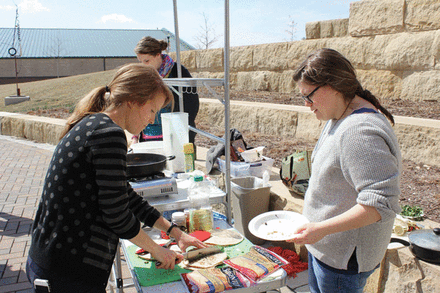
Public health students at the University of Nebraska Medical Center host a healthy cooking demonstration.
In Washington, D.C., the Metropolitan Group sponsored a free webinar on “Putting Culture Into Context: Communicating with Diverse Latino Communities” during National Public Health Week. The fifth installment of the Health Communications Matters! webinar series, the webinar was organized in partnership with the California Public Health Association-North, APHA’s Community Health Planning and Policy Development Section, APHA’s Health Communication Working Group and the California Pacific Public Health Training Center. During the webinar, speakers from Univision, University of Southern California and Georgia State University shared insights, tips and tools for closing the cultural communications gap. Nearly 300 people participated in the webinar, with about 40 percent working in a state, city, county or federal agency. All participants also received a free health literacy guidebook.
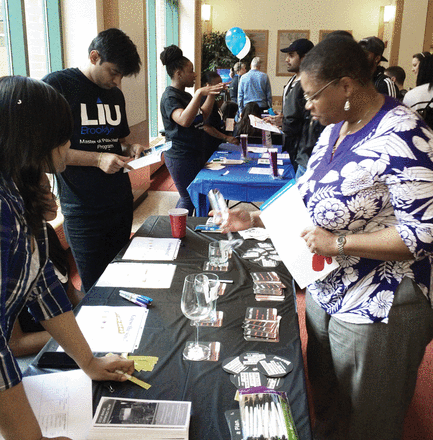
Public Health students at Long Island University in Brooklyn, N.Y., organized an event with five interactive stations.
The Armed Forces Foundation in Washington, D.C., used National Public Health Week as an opportunity to address the health of those who serve in the U.S. military. The Foundation’s 10th Annual Congressional Gala hosted a night of remembrance attended by government officials, military leaders, nonprofit organizations and academic faculty. More than 40 national organizations co-sponsored the event, which helped raise awareness and funds for public health and social programs benefiting active-duty military members, veterans and their families, with a focus on supporting those affected by post-traumatic stress disorder and traumatic brain injury. Among the attendees were Supreme Court Justice Sonia Sotomayor and members of Congress.
At APHA headquarters in Washington, D.C., Association staff hosted a community blood drive and educational games for their colleagues. A scavenger hunt tested staff members’ knowledge of emergency preparedness.
APHA member Carly Hood, MPH, MPA, a population health service fellow at the University of Wisconsin-Madison Population Health Institute in Madison, Wis., wrote a National Public Health Week editorial that was published in the Milwaukee Journal Sentinel newspaper. Hood’s editorial calls for more attention to and action on the social determinants of health, noting that policies that support universal prekindergarten programs and early childhood development have been linked to improved health outcomes.
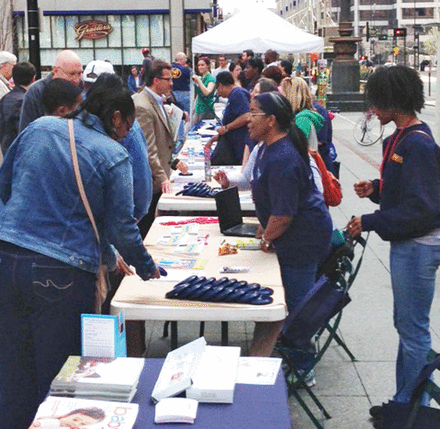
The Cincinnati Health Department in Cincinnati, Ohio, celebrated National Public Health Week with a health information event on the city’s famous Fountain Square.
The Maternal and Child Health Pipeline Training Program at the University of Wisconsin-Milwaukee in Milwaukee, Wis., celebrated National Public Health Week with a daylong series of cultural immersion experiences for undergraduate and graduate students in maternal and child health-related professions. Activities began with a visit to two programs that care for some of the city’s most vulnerable populations. Students also got to tour the rooftop garden growing on the building that houses the programs. Trainees then moved on to visiting the United Community Center and the Adult Day Center, where they learned about oral health issues. Trainees shared their own personal stories of illness with elders and practiced active listening while elders shared their stories.
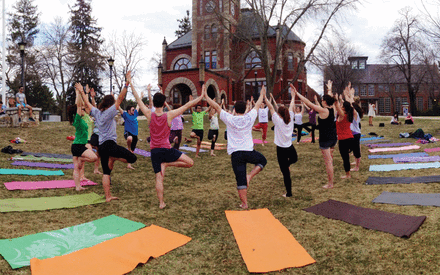
A yoga event is held at the University of New Hampshire.
The Joseph J. Zilber School of Public Health and the Public Health Graduate Student Association at the University of Wisconsin in Milwaukee, Wis., celebrated National Public Health Week with a number of events. On Monday, students staffed an information table and challenged fellow students to write on a chalkboard what public health means to them, posting the photos to the association’s Twitter feed and Facebook page. On Wednesday, the school co-sponsored a screening of “Dark Forest, Black Fly,” a documentary about river blindness. On Thursday, the school hosted the APHA-offered webinar on “Food Justice, Obesity and the Social Determinants of Health.” On Friday, public health students hosted a blood drive. Graduate students ended the week by taking part in a university-wide Hunger Clean-Up event, such as restocking shelves at a food pantry.
The West Allis Health Department in West Allis, Wis., celebrated National Public Health Week with a bulletin board and display of good health tips that greeted visitors in the department lobby. Health workers also provided take-home materials about a community garden project, an asthma home visiting effort and Women, Infants and Children Fit Family campaigns. Five tobacco-free smoking prevention programs aimed at second-graders were conducted during the week, reaching about 125 students. During the outreach, children created a model of a lung with healthy and unhealthy air sacs using raisins and marshmallows. Nursing students also created table tents listing good health habits that were used at elderly nutrition sites and at a church that serves breakfast to homeless veterans.
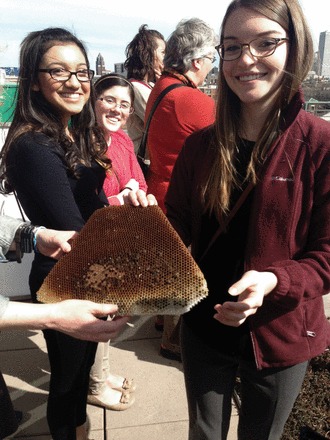
Students at the University of Wisconsin-Milwaukee examine a bee hive on a rooftop garden.
In support of National Public Health Week, Cabell-Huntington Health Department in Huntington, W.Va., hosted a Public Health Fair and encouraged residents to come and learn about the department’s services. More than 100 people attended the fair, which also offered free blood pressure checks, bone density screenings and immunizations.
Evansville, Ind., advocates bring fresh produce to area residents
During National Public Health Week, community health advocates in Evansville, Ind., focused on bringing the opportunity to eat healthier directly to residents.
Fruits and Vegetables Evansville, also known as FAVE, is a mobile market pilot project that brings healthy produce to residents who have little or no access to fresh fruits and vegetables in their own neighborhoods. The pilot project was developed to address the problem of food deserts — defined as areas where it is difficult for residents to find affordable quality foods. Eating healthily was one of the daily themes of National Public Health Week.
During National Public Health Week, mobile project staff added an additional location to their usual route. The mobile market travels to known food deserts, such as public housing communities, and sets up large bins of fresh fruits and vegetables, some of which were specifically added at the request of residents. Because cost is often cited as a barrier to healthy eating, prices are kept low and the produce is sold at cost.
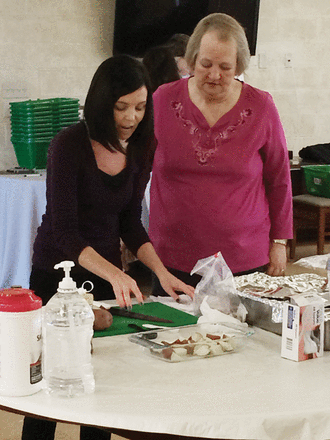
University of Southern Indiana students hold a food demonstration for residents.
Each week of the pilot project, which ran for two months and ended in April, students from the University of Southern Indiana held a food demonstration to show residents new and easy ways to prepare fruits and vegetables. The demonstrations used items that were being sold that particular day and residents were able to taste the dishes they helped create. The partnership said that the mobile market was well-received by residents.
The mobile market project is a collaboration between two hospitals, the University of Southern Indiana and the Upgrade Campaign, all of which are working under the umbrella of the Healthy Communities Partnership of Southwest Indiana.
“Everyone should have the option to eat healthy,” said Shawn Zuber, program specialist at the Healthy Communities Partnership of Southwest Indiana.
To watch a video about the project, visit bit.ly/FAVEVideo.
New Jersey health students visit schools to promote physical activity
Young students in Jersey City, N.J., learned about and enjoyed the benefits of physical activity, thanks to a group of dedicated local college students.
In celebration of National Public Health Week, more than a dozen health and physical education students from Saint Peter’s University prepared a week’s worth of health and fitness activities for kindergarten through eighth-grade students at a local school.
Among the activities was a Family Health Fair, which welcomed more than 200 students and family members.
The fair was sectioned into fitness stations that involved activities such as running, jumping rope and skipping, with many activities designed for child-parent teams. After taking part in each station, participants were entered into a raffle for free prizes.
At the end of the fair, organizers gave away two children’s bikes with helmets, hundreds of jump ropes, hula hoops, Frisbees, T-shirts and skipping toys.
All participants left with a prize, and each family received a bag of fruit and enough jump ropes for every member of the family. Event organizers reported that people were having so much fun that they often visited each activity station more than once.
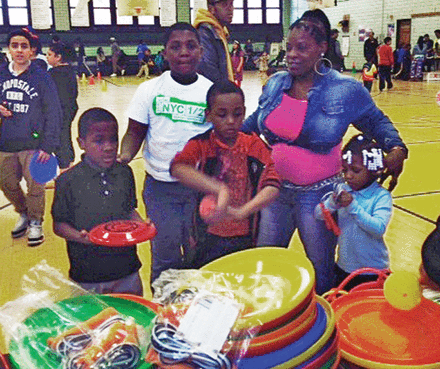
Attendees enjoy the Family Health Fair in Jersey City, N.J., which welcomed more than 200 students and family members.
In addition to the health fair, Saint Peter’s University students spent three days at the school working with and educating students. Activities were specifically tailored to meet the developmental needs of different age groups.
In response to the National Public Health Week activities, the young students wrote letters about the experience, often mentioning the healthy lessons they learned. One student wrote that while Mondays are usually boring, the Saint Peter’s students made the afternoon exciting — “it was a Monday like no other,” the letter stated.
One student wrote about how good it felt to be physically active and why physical activity is good for people’s physical and emotional health.
“The health benefits of the activities I just performed made me feel good...The program can help us physically, socially and emotionally,” the student wrote. “It can help us physically because it helps our cardiovascular system. It helps us lose a couple pounds and also strengthen our muscles. It helps us socially because we are getting time to have fun and socialize with friends. Lastly, it helps us emotionally, because if we are stressed out having time with friends eliminates the stress.”
Other kids recognized that people often do not get enough physical activity. One student, who thanked the university students for teaching new ways to be healthy and physically active, wrote that, “most of the time, we fail to get away from the video games.”
University of Florida students bring public health to the community
Students from across the health sciences took part in the University of Florida’s inaugural National Public Health Week activities.
APHA member Nicole Cranley, MS, a second-year doctoral student in the Department of Behavioral Science and Community Health, decided it was time to bring the annual public health celebration to the Gainesville, Fla., campus, collaborating with six colleges within the university’s Health Science Center to bring messages of good health and prevention to the entire community. The collaboration engaged not only public health students, but students within the colleges of pharmacy, medicine, nursing, dentistry and veterinary medicine. Throughout the week, health sciences students wore T-shirts promoting National Public Health Week.
The week kicked off with a flash mob, in which a group of students, faculty and staff came together in a public space to dance to a special medley of songs with health-related lyrics. The lively health promotion activity drew spectators out of their offices, clinics and classes to watch the performance.
The week of activities continued with Student Research Day, which was hosted by the College of Public Health and Health Professions. Both graduate and undergraduate students presented research posters on a range of health topics. After the poster presentations, students and faculty gathered for a special lecture featuring Susan Fitzpatrick, PhD, vice president of the James S. McDonnell Foundation, an organization based in St. Louis, Mo., that has awarded millions in grants to support research and scholarship. During her presentation, Fitzpatrick spoke on “Career Optimism: Carving Your Own Destiny in Health Research.”
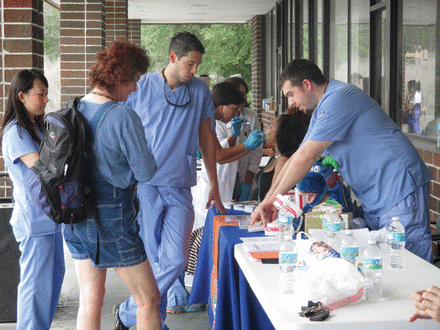
One of the many events held by health sciences students at the University of Florida included a Public Health Student Expo.
Next on the National Public Health Week itinerary, community partners and health care professionals came together to debut the university’s first Public Health Student Expo. The expo offered demonstrations, information and the opportunity to learn about available health care resources both on and off campus. Following the student expo, Cranley led a team of students into the larger community for the Public Health Community Expo. The community expo brought health services, such as dental exams and blood pressure screenings, to underserved neighborhoods in the Gainesville community. Faculty and community health partners joined Cranley and her students in bringing free health services to residents.
Throughout the week of activities, participants were also encouraged to nominate their friends, coworkers and associates for the University of Florida’s first Public Health Heroes Award. The first recipient of the award, which was bestowed by a panel of alumni from the College of Public Health and Health Professions, was William Kennedy, MHS, executive director of the Center for Independent Living of North Central Florida. The center, which serves people living in 16 counties, provides assistance to help people with disabilities live independently and advocates for the policies and resources that make independent living possible.
Hawaii college students celebrate public health
Education, networking and some time spent with man’s best friend were among the National Public Health Week events at the University of Hawaii-Manoa in Honolulu, Hawaii.
Hui Ola Pono, the undergraduate and graduate student organization within the university’s Office of Public Health Studies, organized a week full of activities in observance of National Public Health Week, culminating in an opportunity to meet trained therapy dogs and learn about the health benefits of pets.
But first, the student organization partnered with a number of local organizations to boost student engagement and promote public health on campus and in the larger community.
The week of activities began on Monday with an opportunity for students, faculty and staff within the Office of Public Health Studies to come together and enjoy healthy foods and drinks and get excited about this year’s public health celebration. On Tuesday, the Gamma chapter of Delta Omega held its fourth annual distinguished lecture and induction ceremony, presenting its Distinguished Lecture Award to Deane Neubauer, PhD, vice president for academic affairs and professor emeritus of political science at the university as well as co-director of the Asia Pacific Higher Education Research Partnership. Neubauer spoke to attendees, who included students, community members and Hawaii Gov. Neil Abercrombie, about globalization and health policies. During the event, four students were inducted in the Delta Omega Honorary Society in Public Health.
On Wednesday, the student organization in partnership with the University of Hawaii School of Public Health Alumni Association hosted its second annual alumni-student mixer. During the event, students had the opportunity to network, mingle and gain valuable insight about public health careers in Hawaii. To facilitate student-mentor connections, the mixer hosted a speed networking event in which students could have one-on-one conversations with alumni.
On Thursday of National Public Health Week, students took part in a healthy happy hour. With the launch of the university’s new undergraduate public health program, the happy hour was organized to give undergrads the opportunity to connect with graduate public health students as well as faculty.
Also on Thursday, many students attended the Hawaii Public Health Association annual mixer and fundraiser, which was open to both association members and nonmembers. The event also gave students the opportunity to meet Linda Rosen, MD, MPH, the new director of the Hawaii State Department of Health.
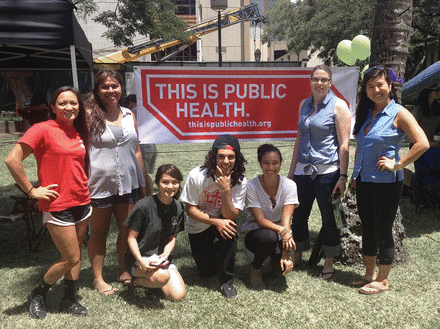
Public health students at the University of Hawaii-Manoa in Honolulu organized a full slate of activities in observance of National Public Health Week.
Hui Ola Pono ended the week with a booth set up on campus to raise awareness about public health.
Joining the student organization with its own booth was the university’s Community Engaged HPV Vaccination Research Project. During the event, Tails of Aloha, a local volunteer animal-assisted therapy organization, visited campus with therapy dogs in tow. The event reached more than 160 students, faculty and staff.
Kane County, Ill., staff engage in activities
It was all fun and games during the launch of National Public Health Week at Kane County Health Department in Aurora, Ill.
The celebration began on Monday morning with an all-staff meeting. To get staff excited about the week’s activities, department Executive Director Barbara Jeffers, MPH, talked about the five daily National Public Health Week themes and staff took part in an interactive game designed with the five daily themes in mind. The themes focused on issues such as preparedness, prevention and healthy eating.
Game participants were given a “passport” to be stamped upon completing each activity. The activities included hand-washing demonstrations, information on what to do upon finding a suspicious object, a board game about health disparities in early life and a game in which participants had to guess the date of particular public health achievements throughout history.
The morning meeting ended with staff — all wearing royal blue Kane County Health Department polo shirts — taking a brisk walk around the office building to promote physical activity.
National Public Health Week in Kane County also began with a public health exhibition in the health department building. Several local colleges and universities set up booths and displays and representatives offered information about continuing education opportunities and public health academic programs.
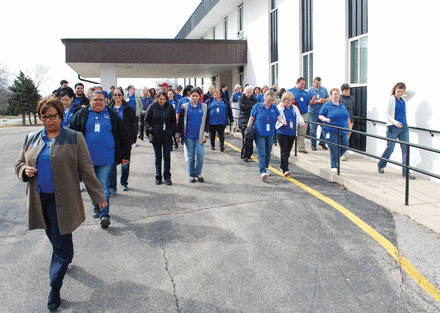
Kane County Health Department staff take a walk around their office building to promote physical activity.
To spread word about National Public Health Week and its healthy living messages, Kane County health staff prominently featured the weeklong celebration on its Facebook page and Twitter feed. The department also posted APHA’s Healthiest Nation in One Generation video on its “Focus on Health Issues” Web page at www.kanehealth.com/focus.htm.
Kane County Health Department celebrated this year’s National Public Health Week observance as an accredited public health department. Last year, the Kane County Health Department officially submitted its application for public health accreditation, which requires a comprehensive review of core public health functions and a commitment to public health quality improvement. In November 2013, the department became the first county health department in Illinois to be awarded five-year accreditation status by the Public Health Accreditation Board.
Dutchess County, N.Y., debuts health improvement plan
In Poughkeepsie, N.Y., the Dutchess County Department of Health observed National Public Health Week with the release of the county’s first comprehensive Community Health Improvement Plan.
At an event celebrating the plan’s release, local and state officials gathered to sign a Declaration of Wellness, which states the importance of health and wellness to residents’ quality of life and highlighted the commitment of community partners to contributing toward better health for all. Dutchess County Acting Health Commissioner Kari Reiber, MD, was joined by fellow county officials, representatives from the health, business, education and nonprofit sectors as well as New York State Commissioner of Health Nirav Shah, MD, MPH, in signing the declaration.
Signers of the declaration pledged to take part in a number of activities, including promoting school and workplace policies that support healthy eating, supporting education programs that encourage healthier behaviors, encouraging restaurants to display calorie counts, promoting school-based health and mental health programs, and encouraging health care providers to strengthen chronic disease prevention.
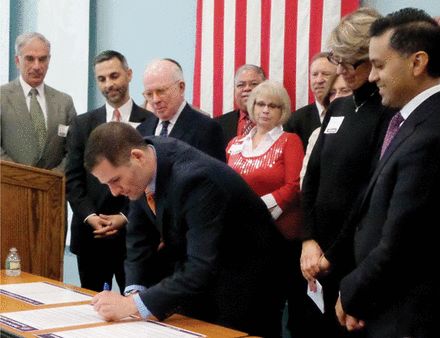
Dutchess County Executive Marcus Molinaro signs the Declaration of Wellness. Also pictured from right are New York State Health Commissioner Nirav Shah, County Commissioner of Health Kari Reiber and community leaders.
The health improvement plan has four priority areas: reducing childhood and adult obesity, increasing access to preventive health care and improving the management of chronic disease, reducing tick- and insect-related disease, and reducing substance abuse. The goal and objectives of the plan are aligned with national and state initiatives, such as Healthy People 2020 and New York’s statewide prevention agenda.
To develop the five-year community improvement plan, local officials led a process based on three main characteristics: inclusiveness, comprehensiveness and local ownership. The final plan was based, in part, on community health assessments and surveys. For example, in a 2012 survey, making health care affordable and making health insurance easier to obtain were among respondents’ top five concerns. The survey also found that 21 percent of Dutchess County households had experienced a gap in health insurance coverage some time in the past or current year.
Also, 40 percent of overall survey respondents and more than half of black respondents reported difficulties in obtaining health insurance. Not including health insurance costs, 39 percent of respondents reported financial strains due to health care and medical costs.
During the National Public Health Week event, health officials highlighted several community programs already producing results, such as the Hudson Valley Farm to School Program, which encourages the use of local farm produce in school cafeterias.
For more information on the plan, visit www.co.dutchess.ny.us.
Brooklyn, N.Y., meal delivery group spreads message of compassion
Raising awareness through social media was at the heart of National Public Health Week activities for God’s Love We Deliver in Brooklyn, N.Y.
Begun as an HIV/AIDS service organization in 1986, God’s Love We Deliver brings meals and nutrition education to people living with severe illnesses, delivering thousands of free meals every day to residents in need. During National Public Health Week, staff wrote and published posts on the group’s blog to coincide with each daily theme.
For example, on Monday, which had a theme of “Be Healthy from the Start,” a blog post focused on how positive health habits start at a young age. The post noted that last year, God’s Love We Deliver delivered more than 58,000 meals to 279 children in 170 families affected by breast cancer, HIV/AIDS, multiple sclerosis and other illnesses.
“A parent’s illness affects the entire family,” the blog post said. “When parents are incapacitated due to a serious illness, they may be unable to prepare meals and care for their children. Our Children’s Meal Program relieves household food insecurity, addresses the unique nutritional needs of young children, and successfully raises awareness of nutrition in vulnerable and low-income households affected by serious illness.”
An emergency preparedness blog post promoted stockpiling a supply of nonperishable foods and linked readers to a guide about assembling an emergency food kit. Another blog post noted that “good food can be preventive medicine,” and cited national survey results that found that many people living with chronic diseases also reported trouble affording food.
In the last blog post of the week, which coincided with the daily theme of “Be the Healthiest Nation in One Generation,” the blog focused on the power of nutrition, noting that, “when we at God’s Love consider the meaning of health, we immediately turn to nutrition.”
The last blog post also highlighted the organization’s significant impact. According to an organizational survey, 85 percent of participants reported that God’s Love We Deliver services helped them live more independently, 89 percent said the services helped them eat more nutritiously and 87 percent reported less household food anxiety.
To learn more, visit www.godslovewedeliver.org.
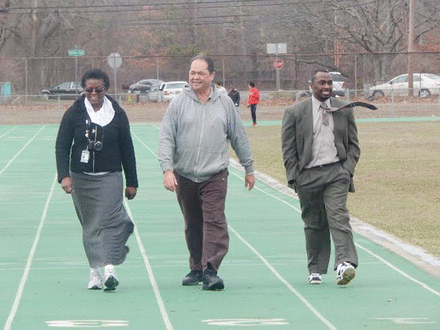
Events in the Wyandanch School District in Wyandanch, N.Y., included a healthy walk around the high school track.
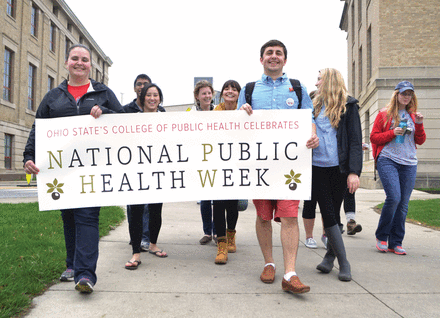
Activities at Ohio State University College of Public Health in Columbus, Ohio, included a walk on campus led by Buckeyes 4 Public Health and Student Ambassadors for Public Health.
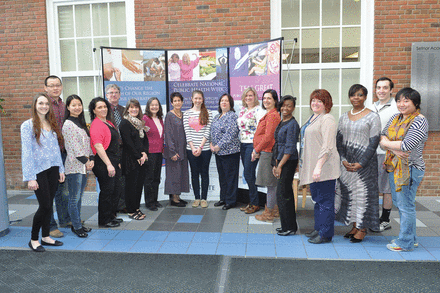
A display at Upstate Medical University in Syracuse, N.Y.

Interacting at a health event held in Portland, Ore.
Portland, Ore., photo courtesy Allan Visnick
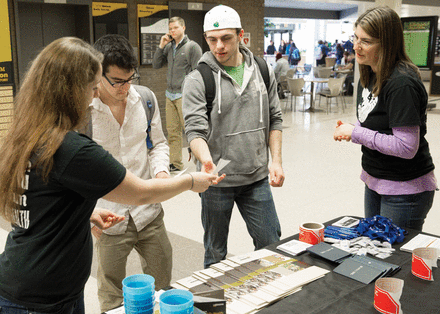
An information table at the University of Wisconsin-Milwaukee
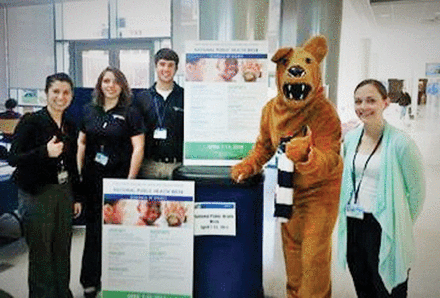
At Penn State’s Milton S. Hershey Medical Center
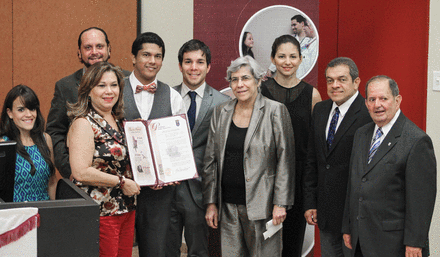
A public health week event is held in Puerto Rico.
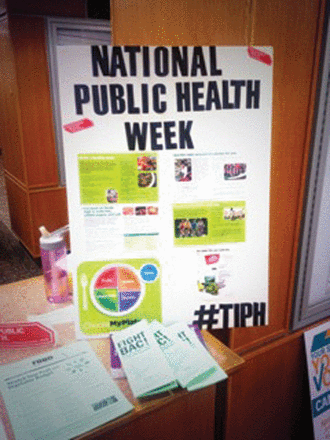
A display shares information about healthy eating and nutrition at the University of North Dakota.
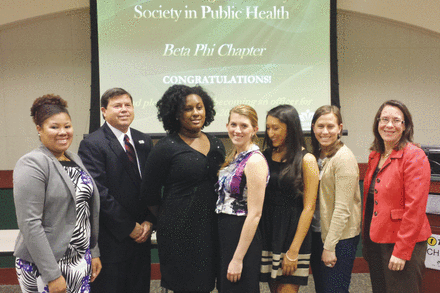
The University of North Carolina-Charlotte held an induction ceremony for its Delta Omega Honorary Society in Public Health, Beta Phi Chapter.
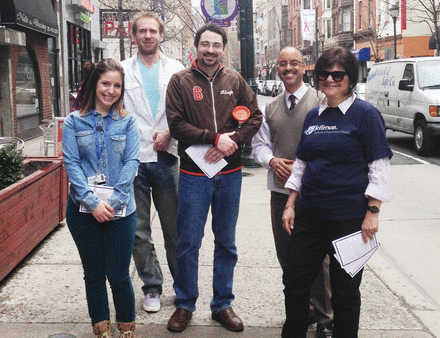
A public health walking tour is led by Thomas Jefferson University in Philadelphia.
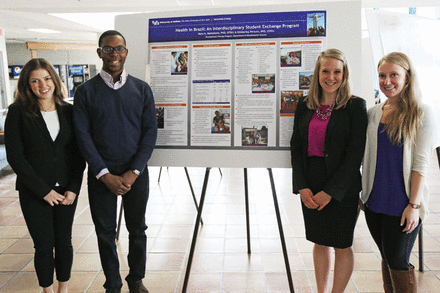
A health poster is shared at the University at Buffalo-SUNY in Buffalo, N.Y.

A 5K run was held by Hofstra University students in Hempstead, N.Y.
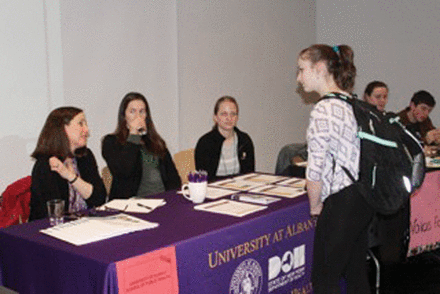
A Skidmore College booth in Saratoga Springs, N.Y.
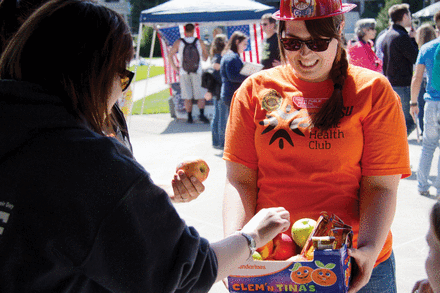
A health fair held by students at Oregon State University in Corvallis, Ore., featured fruit for participants.
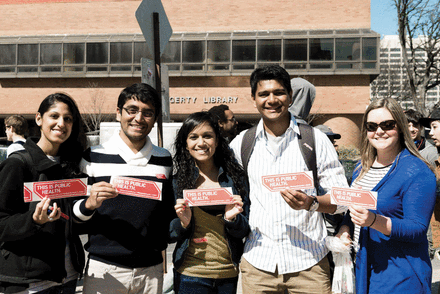
Public health students celebrate the week at Drexel University in Philadelphia.
Drexel University photo courtesy Alex Krengel
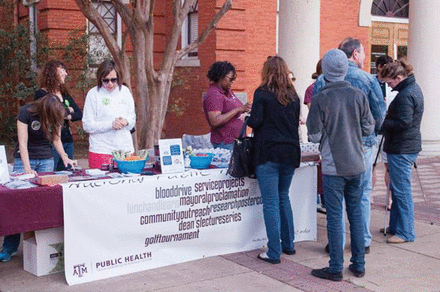
Sharing information at Texas A&M in College Station, Texas
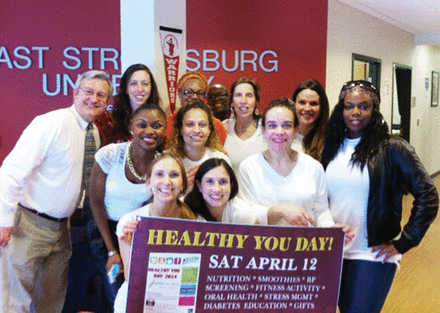
At East Stroudsburg University in Bethlehem, Pa.
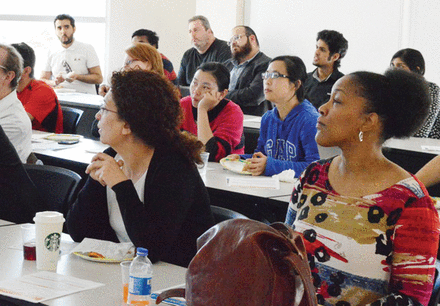
A health session at the University of South Carolina
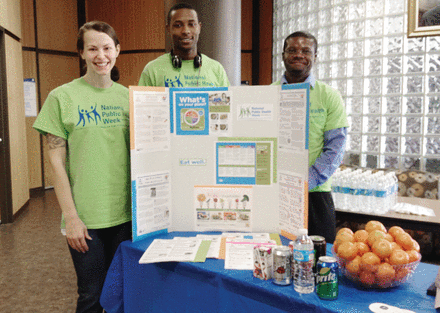
At Jefferson College of Health Sciences in Roanoke, Va.
Jefferson College photo courtesy Diana Willeman-Buckelew
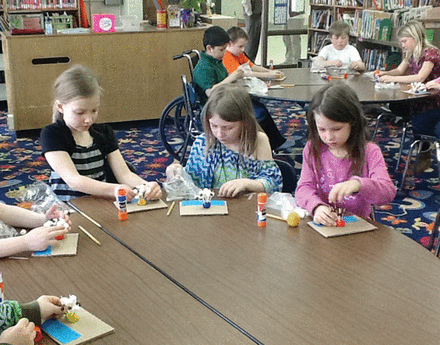
Kids learn about health topics in West Allis, Wis.
- Copyright The Nation’s Health, American Public Health Association


